News Archive
Tuesday, 3 April 2018
The Centre for Disability Law and Policy (CDLP) and Irish Disability Studies Association (IDSA) are delighted to announce they will host the 2nd poster presentation evening at the 10th International Disability Law Summer School (see flyer: Poster Presentation). Where: The Institute for Lifecourse and Society, NUI GalwayWhen: Tuesday 19th June from 5:30pm to 7:30pm.Cost: 30 euro payable on the day. Light refreshments will be served. The aim of this poster presentation is for researchers from any discipline related to disability to present and discuss their work with colleagues in an informal setting. We would welcome those who wish to present their poster to attend the full day of Summer School. The theme for Tuesday is Introduction to Intersectionality and will include panels on Legal Capacity and Personhood, and Community Living. How to Submit Applicants should submit their expressions of interest by email to cliona.debhailis@nuigalway.ie on or before 18th May 2018, emails should have the subject line “ISDA Summer School Poster” Any further questions regarding the poster presentation should be directed to Clíona at cliona.debhailis@nuigalway.ie
Friday, 17 March 2017
The CDLP is happy to announce the publication by the Asia/Pacific Forum of National Human Rights Institutions of a Manual on the role of NHRIs in advancing the rights of persons with disabilities (2017).Two of its staff - Prof Gerard Quinn and Ms Abigail Rekas-Rosalbo - were directly involved in its production. We congratulate the Asia/Pacific Forum for the opportunity to work on the project and hope and expect it will have a positive impact among NHRis around the world.The Manual can be downloaded here: http://www.asiapacificforum.net/media/resource_file/Human_Rights_and_Disability_Manual.pdfFor more on the outstanding work of the Asia/Pacific Forum on disability rights, visit: http://www.asiapacificforum.net/human-rights/people-disabilities/
Thursday, 1 August 2019
Congratulations to our colleague, Dr Shivaun Quinlivan, and to our former colleague, Prof. Gerard Quinn, whose work was cited yesterday by the Irish Supreme Court in a landmark decision on disability equality law. Other work by Dr Quinlivan, and by students of the LLM in International and Comparative Disability Law and Policy, was previously incorporated in the General Comment on Article 5 of the UN Convention on the Rights of Persons with Disabilities (CRPD). The General Comment, which addresses equality and non-discrimination for persons with disabilities, was adopted by the UN Committee on the Rights of Persons with Disabilities last year. Dr Quinlivan and Prof. Quinn are experts in disability law, and the citation of their work is a testament to the quality of their research, and to its national and international impact. The incorporation of wording by our LLM students in the General Comment demonstrates the very high quality of their work also, and their strong commitment to social justice. Our congratulations to all concerned, and also to Dr Quinlivan, who led the group, on this wonderful achievement. The full decision of the Supreme Court is available at: http://www.courts.ie/Judgments.nsf/09859e7a3f34669680256ef3004a27de/0036387fa70d0e74802584480046ab2b?OpenDocument The General Comment on Article 5 of the CRPD is available at: https://www.ohchr.org/en/hrbodies/crpd/pages/gc.aspx
Tuesday, 17 January 2017
The CDLP in conjunction with the UN Special Rapporteur on the Rights of Persons with Disabilities has commenced a global research project on disability-specific forms of deprivation of liberty, with funding from the UK Department for International Development. This research plans to examine deprivations of liberty operating at three levels: formal (state regulated), informal (community-driven) and in the private sphere. Formal deprivations of liberty will include those regulated and sanctioned by the state (including detention in hospitals and social care homes). Informal deprivations of liberty will include actions undertaken by the community (e.g. prayer camps and shackling). Deprivations of liberty in the private sphere will focus on people deprived of their liberty in the family home or other private settings, in light of the positive duties of the state to prevent arbitrary and discriminatory deprivations of liberty affecting persons with disabilities.
Wednesday, 17 January 2018
The Centre for Disability Law and Policy are delighted to announce that the 10th International Disability Law Summer School will take place from Monday 18th June Friday 22nd June 2018 in Galway. The theme will explore Intersectionality. The Summer School seeks to equip participants with the insights and skills necessary to translate the generalities of the UN Convention on the Rights of Persons with Disabilities into tangible reform for persons with disabilities.We look forward, as usual, to a world-class Faculty and participants from around the globe including persons with disabilities, civil society groups, advocates for disability law reform, academics, lawyers, policy makers and policy analysts. More information and draft programme will follow in the New Year.Information from the 9th International Disability Law Summer School .REGISTRATION OPENS JANUARY 2018
Wednesday, 7 March 2018
Four students of NUI Galway are organising a Project of Equality, ‘Disability Open Day’, being held in the ILAS Centre, NUI Galway on the 15th March 10am to 3pm.The event is aimed at raising awareness about disability among our current students and staff, as well as motivating secondary school students and young adults with various capabilities, who are interested in continuing on to college. The open day takes the form of an exhibition and talks from 10pm to 3pm. It is funded by the Equality, Diversity and Inclusion Project Grand of NUIG and organised by four students of the college, some with a disability themselves. Download the poster here: Disability Open Day, 15th of March in NUI Galway The Schedule for the event is: Registration 10.00am-10.30am, Exhibition 10.30-11.00am, Presentation/ Talk 11.00am – 1.00pm Refreshments 1.00pm to 3.00pm. Project Team: Eliona Gjecaj, Colman O’ Connell, Eamon MacGiobúin and Cansu Akkoyun Any Queries please contact Eliona GJecaj at elionagalway@gmail.com
Thursday, 22 March 2018
Congratulations to Elizabeth Kamundia, a graduate of the programme at the Centre for Disability Law & Policy, who has been appointed as a Senior Human Rights Officer at the Kenyan National Commission on Human Rights. Elizabeth was a DRSP Scholar at the CDLP and was awarded the inaugural Gold Medal for the programme having graduated top of her class in 2012.
ResPoNCE: Respecting People with disabilities’ Needs and rights in Crisis and Emergency, we are now recruiting for a Part-time (50%) fixed term position as a Research Assistant with the Centre for Disability Law and Policy (CDLP)
22 January 2021Applications are invited for suitably qualified candidates for a part-time (50%) fixed term position as a Research Assistant with the Centre for Disability Law and Policy at the National University of Ireland, Galway. This position is funded by Health Research Board (HRB) and is available from January 2021 to 13th January 2023.
This project aims to explore the impact of strategic decision-making created by states and healthcare systems in Europe in order to establish whether the rights and needs of people with disabilities are being met. It has been established that people with disabilities are a high risk group, but there is disagreement and uncertainty as tohow their needs should be met. This project will provide guidance to governments, medical councils and healthcare professionals in order to maintain states obligations under the United Nations Convention on the Rights of People with Disabilities (CRPD). Many systems currently used during the pandemic by general populations (e.g remote working) exist because of reasonable accommodations hard fought for by disabled people. Using the CRPD framework, this project will critically analyse relevant laws, policies and guidelines that emerged in response to the Covid-19 pandemic in Ireland, Spain, UK, Italy, Sweden and Germany, It will establish whether, and how, these states complied with their CRPD obligations during the Covid-19 pandemic, and how public health measures and human rights could work in tandem to disseminate guidance and best practice to relevant stakeholders. It seeks to assess the impact of strategic aspects of decision-making on the lived experience of disabled people in Ireland, UK and Spain to inform and reflect a shared lived reality among disabled people.
The Centre for Disability Law and Policy was established in 2008 and is part of the School of Law, and the Institute for Lifecourse and Society at the National University of Ireland, Galway. It is dedicated to producing research that informs debate on national and international disability law reform. More information can be viewed at www.nuigalway.ie/cdlp/
Tuesday, 8 December 2020
The Centre is delighted to announce: ResPoNCE: Respecting People with disabilities’ Needs and rights in Crisis and Emergency Lead Researcher: Professor Eilionoir Flynn, NUI Galway Project timeframe: Mid December 2020 to January 2023 The COVID-19 crisis has led to numerous new strategies, laws, policies and guidelines around Europe, but how do these affect disabled people? A new project supported by the Health Research Board and the Irish Research Council will look at decisions made during the pandemic in several European countries and their impact on people with disabilities. The research will provide guidance for decision-making bodies to help them maintain their obligations under the United Nations Convention on the Rights of People with Disabilities. What is the issue? Strategic decisions made by countries and healthcare systems in the pandemic may not always support the rights of people with disabilities. What will the research project do? Using a framework developed by the United Nations Convention on the Rights of People with Disabilities the project will analyse laws, policies and guidelines that emerged in response to the COVID-19 pandemic in Ireland, Spain, UK, Italy, Sweden and Germany. What will the impact be? This project will provide guidance to governments, medical councils and healthcare professionals in order to maintain obligations under the United Nations Convention on the Rights of People with Disabilities. Professor Eilionoir Flynn, Established Professor at the School of Law and Director of the Centre for Disability Law and Policy at NUI Galway, says: “Emerging research findings, including from the International Disability Alliance and other disability groups, demonstrate that disabled people globally are disproportionately impacted by the current pandemic. Not only are disabled people at greater risk of contracting the virus and experiencing adverse effects (especially those living in institutional settings) but they are also disproportionately affected by restrictions in access to community services and supports. This research will help us to understand in more depth how countries can respond to the challenge in ways that protect the human rights of disabled people".
Wednesday, 17 January 2018
A two-day conference will take place between January 20-21, 2018 on 'EU-China International Disability Employment Law: From Sheltered Workshops to Supported Employment in the Open Labor Market - a Mutual Challenge.' at the Shanghai University of Finance & Economics, China. This conference will bring together some leading disability law and policy experts from both Europe and China for an open exchange of experiences and perspectives on the global effort to move persons with disabilities away from sheltered employment and toward employment in the open labor market with appropriate support.The conference organizers are the Law School, Shanghai University of Finance & Economics and Shanghai Zhijun Public Interest & Law Institute: the co-organizers are the Centre for Disability Law & Policy, NUI Galway and the Disability Law Hub, School of Law, University of Leeds.A conference programme can be downloaded here: Shanghai conference Programme
Tuesday, 18 September 2018
A new European-wide training network for early stage researchers in the field of disability rights has received €4.1m in funding from the European Commission’s Marie Curie programme. This network is known as the DARE Project (Disability Advocacy and Research for Europe) and will be co-ordinated by the Centre for Disability Law and Policy at the National University of Ireland, Galway, with the collaboration of 7 partner institutions: the Institute for Social and Political Sciences (Portugal) , Maastricht University (Netherlands), University of Leeds (UK), the European Disability Forum, the European Association of Service providers for Persons with Disabilities, the University of Iceland and Swiss Paraplegic Research.Dr. Eilionóir Flynn, Principal Investigator at NUI Galway said “The primary aim of DARE is to equip a new generation of researchers to respond to global challenges facing persons with disabilities and policy makers. Its goal is to give legitimacy, through research, to the lived experience of persons with disabilities, as a basis for law reform.” Fifteen Early Stage Researchers (ESRs) will be recruited across the network on a full-time basis over three years starting in September 2019 and will explore and develop recommendations for disability law and policy reform in light of the United Nations Convention on the Rights of Persons with Disabilities. All of the researchers will also have the opportunity to gain invaluable and funded work experience with leading civil society and public service organisations such as JUSTICE (UK), AGE Platform Europe (Belgium), the United Nations Special Rapporteur on the Rights of Persons with Disabilities (Switzerland), the International Foundation for Electoral Systems (USA), the European Network of National Human Rights Institutions (Belgium), Pi Consultancy (Netherlands), University of Limerick (Ireland), Lumos (UK), Christian Blind Mission (Ireland), European Social Network (Belgium), European Association of Palliative Care (Belgium), Pi Consultancy (Netherlands) and Vision Sense (UK).
Friday, 8 March 2019
Pictured is Emily Cukalevski, winner of the Centre for Disability Law & Policy Gold Medal for Excellence 2018. Emily came first in her LL.M International and Comparative Disability Law & Policy class in 2017/18.
Tuesday, 13 August 2019
Research Assistant, Centre for Disability Law and Policy Applications are invited from suitably qualified candidates for a part-time (60%) fixed term position as a Research Assistant with the Centre for Disability Law and Policy at the National University of Ireland, Galway. This position is available from 1 September 2019 to 31 August 2020 and may be renewed depending on funding. The Centre for Disability Law and Policy was established in 2008 and is part of the School of Law, and the newly-founded Institute for Lifecourse and Society at the National University of Ireland, Galway. It is dedicated to producing research that informs debate on national and international disability law reform. Employment permit restrictions apply for this category of post.NB: Gárda clearance is a requirement for this postSalary: €22,110 - €34,612 per annum pro-rata - for part time contracts (public sector pay policy rules pertaining to new entrants will apply) Start date: 1st September 2019.Further information on research and working at NUI Galway is available on Research at NUI GalwayFor information on moving to Ireland please see www.euraxess.ie Further information about CDLP is available at www.nuigalway.ie/cdlp/ To Apply: Queries about the post should be directed to the Principal Investigator, Professor Eilionóir Flynn eilionoir.flynn@nuigalway.ie Applications to include a covering letter, CV, and the contact details of three referees should be sent, via e-mail (in Word or PDF only) to Joanna Forde, joanna.forde@nuigalway.ie Please put reference number NUIG 160-19 in subject line of e-mail application.Closing date for receipt of applications is 5pm Friday 16th August 2019 Please note interviews will take place w/b 26th August. National University of Ireland Galway is an equal opportunities employer. Job Description: Principal Duties and Responsibilities The successful candidate will provide research support to the Centre Director and Deputy Director on key research projects. These include the following Disability/Visibility, funded by the Irish Research Council and Irish Human Rights and Equality Commission (including conference on 3 September 2019) Disability and Human Rights Monitoring, CDLP Winter School, December 2019 Assisted Decision-Making (Capacity) Act Training Course, September 2019 and April 2020 The Research Assistant will be also expected to contribute to the broader ongoing research mission of the Centre, including by providing research support for various legislative and policy submissions or amicus briefs at national, European and international levels. Duties: Support the Director to review and organize research paper abstracts for the Disability/Visibility network into thematic groups of relevance to IHREC’s mandate Prepare a comprehensive overview of submissions received to the Disability/Visibility network regarding the future of disability research on the island of Ireland Develop, under the supervision of the Director, a report for submission to IHREC on the research outputs of the Disability/Visibility network and support the co-ordination of submissions for a special issue arising from the September conference. Prepare a series of case studies and updates to the lists of resources and materials used in the delivery of the Centre’s bi-annual Assisted Decision-Making Capacity Act training courses. Assist in the delivery of research-led training and interactive group work exercises during the Centre’s bi-annual Assisted Decision-Making Capacity Act training courses. Prepare research and training materials for the Centre’s first inaugural Winter School on Disability and Human Rights monitoring, liaise with participants and invited speakers on their contributions, support with travel and accommodation arrangements and identify and make arrangements to meet all logistical and accessibility needs. Manage and contribute to the Centre website. Contribute to ongoing research projects in the Centre. Collaborate with other members of the research team to complete legislative and policy submissions on behalf of the Centre. Assist the Director, Deputy Director and the Business Manager of the Centre in preparing funding proposals. Qualifications: The ideal candidate should have a proven track record in a research environment and strong disability law and policy experience is essential. Applicants must have a primary degree, ideally a Masters degree, in law, social policy or an area relevant to disability or reproductive justice. Candidates should have excellent communication and organisational skills; be highly motivated and passionate about disability and reproductive justice; and have strong documentation, oral and interpersonal skills, sensitive to disability and mental health issues. Essential Requirements: Holds a primary degree, ideally a Masters degree, in law, social policy or an area relevant to disability or reproductive justice A minimum of one year’s research experience Experience of event organization and management Experience of research support tasks such as maintaining files following events, analysing feedback and writing reports and maintaining databases. Experience in maintaining websites and social media accounts Excellent and proven ability to work collaboratively within a team. Excellent and proven ability to work independently and use initiative. Fluency in oral and written English. Desirable Requirements: Ability to multi-task and work under pressure. Experience of collaborating and co-ordinating with other members of a research team. Excellent communication and interpersonal skills.
Tuesday, 30 January 2018
The Committee for Employment & Social Security in the states of Guernsey have appointed Dr Shivaun Quinlivan and Dr Lucy-Ann Buckley of the School of Law and the internationally-acclaimed Centre for Disability Law and Policy to advise progress on the development of Disability Discrimination Legislation. They will advise the Committee on which country's legislation would be most appropriate for Guernsey to model its disability discrimination legislation on. They will assess the approach taken in a number of countries based on evaluation criteria which will be agreed by the Committee in consultation with key stakeholders. This will underpin the shape of the future legislation. It is hoped that a model law will be identified by the end of March, following which proposals will be developed regarding how the model legislation should be tailored to the Guernsey context. The Committee is aiming to consult with the public on developed policy proposals before the end of 2018. Further information can be found at the official website at the states of Guernsey.
Wednesday, 25 July 2018
Every year, the Law School offers tutorials to our undergraduate and LL.B. students in the core Irish law subjects. Applications are invited for tutoring positions in the following subjects: Administrative Law Company Law Constitutional Law Contract Law Criminal Law Land Law Law of Equity Law of Torts Applicants must hold a 2.1 undergraduate law degree. If you are interested in tutoring in the academic year 2018/209, please submit a one page CV to Tara Elwood, Law School, NUI Galway by Friday 10 August 2018, indicating your preferred subject area(s). Interviews will be held week commencing 20 August 2018.
Thursday, 2 April 2020
The rights of persons with disabilities in congregated settings within the COVID-19 emergency Updated 12th May 2020 We recognise the extensive work and sincere commitment of the National Public Health Emergency Team (NPHET) in responding to the COVID-19 emergency. We appreciate the work of HSE Seclusion and Restraint working group to develop guidelines in relation to people with intellectual disabilities during the COVID-19 emergency. As this is an emerging situation it is important to use the limited information available to in the public spheres. The purpose of this paper is to capture the critical information that may be relevant to Ireland at this time in relation to persons with disabilities residing in congregated settings. This paper will outline the rights of persons with disabilities resident in congregated settings in Ireland under the UNCRPD. It will then look at reports and practices in other countries of how similar services are responding to the COVID-19 pandemic. It will make recommendations as to how to address core issues which have been identified by disability service providers in Ireland. This paper is focused on the operation of residential settings. We acknowledge that persons with disabilities living in the community will also experience significant barriers to the realization of their right to the highest attainable standards of health, the right to live independently and to be treated equally to non-disabled people. Adequate supports must be provided to persons with disabilities who receive support and care from family members. DOWNLOAD Full briefing paper >> COVID-19 Briefing Paper
Thursday, 18 June 2020
As a result of the postponement of this year’s International Disability Law Summer School we are running a webinar on Disability and Access to Culture, Recreation, Leisure and Sport. On Tuesday 23rd June at 1pm (GMT+1) we will be hosting a webinar via the Centre's YouTube channel with some of our summer school speakers to begin to explore this important and often overlooked topic. Confirmed speakers include Sinéad Burke, Nidhi Goyal (Rising Flame) and Abigail Rekas (University of Augsburg). ** Update ** You can watch back on YouTube This will coincide with a 24 hour tweetchat #disabilityculture that is open to all bring together the disability rights community to begin discussion on this important issue. Looking forward to seeing you tuned in. Remember you can submit your questions in advance to disabilitysummerscho@nuigalway.ie or submit on the day using the twitter hashtag #disabilitycultureQ&A while the webinar is live on Youtube. The link to our youtube channel is here: https://www.youtube.com/user/CDLPNUIG Warm regards,Eilionóir and Maria Summer school team,Centre for Disability, Law and Policy (CDLP)
Tuesday, 10 April 2018
Report calls for policy change to enable persons with disabilities the opportunity to direct their own services and live independently A report published by Dr Eilionóir Flynn the Centre for Disability Law and Policy at NUI Galway, calling for policy change to enable persons with disabilities the opportunity to have greater choice and control over their service provision, was recently launched at the Disability Federation of Ireland by Senator John Dolan. The report entitled ‘Independent Living: An Evaluation of the Áiseanna Tacaíochta model of Direct Payments’ was undertaken by Professor Gerard Quinn and Dr Sinéad Keogh from NUI Galway, examines if direct payments, where individuals with disabilities purchase services and direct their own care, creates a better quality of life than that of the traditional model of service provision, at no extra cost. Professor Gerard Quinn from NUI Galway, comments: “The past number of years have seen a global shift from a welfare system, which has treated persons with disabilities as dependent, passive recipients of ‘care’, towards a growing recognition of the need for a new approach that enables persons with disabilities to assume an active role in the society in which they live. This has been mirrored in Ireland by the growing demand by the Irish disability community for control and choice over how they wish to live their lives and the services they use.” The report reaffirms the findings of international literature that point to considerable benefits for users of direct payments, arising from greater flexibility, choice, independence, continuity of support and the customising of support packages. It also highlights the need for a policy change in Ireland in relation to how services are delivered for persons with disabilities’ and emphasises the need for a change to the current model of service provision in Ireland. Key findings from the report: The Direct Payments model of service provision, facilitated by Áiseanna Tacaíochta, places persons with disabilities at the centre of the decision-making process, recognises their strengths and preferences and gives them the confidence, support and means to shape the way in which their care is provided by transferring choice and control over funding decisions to them and allowing them to identify their unique individual needs. Not only does the Direct Payments model of individualised funding offer more clarity and transparency as to how public funds are spent but the Direct Payments model demonstrates cost savings and cost efficiencies. The report estimates that eighteen people achieved cost savings of approximately €136,000 in one year by directing their own services, such as hiring their own personal assistants and taking on the administrative burden that comes with running their own companies. The report makes four key recommendations: The need for the Direct Payments model and other models of individualised funding to receive further funding and support from the Government. The importance of the requirement of a single assessment tool to evaluate individuals’ resource allocations based on individual goals, the impact of disability, family circumstances and living arrangements. The transformation of the disability service provision model to permit persons with disabilities to more easily move their service provision from one Community Healthcare Organisation to another. Individualised funding budgets being extended to the purchase of equipment, aids, and other goods and services that relate to the healthcare needs of the individual following an assessment. Commenting on the results from the report, María Soleded Cisternas Reyes, United Nations Special Envoy on Disability and Accessibility, said: “This report shows that without a doubt, direct payments, as a model of service provision, works to give independence back to persons with disabilities. Being in control of one’s services enhances well-being and empowers individuals. Direct Payments is a step in the right direct for service provision in Ireland.Professor Theresia Degener, Chair of the United Nations Committee on the Rights of Persons with Disabilities and Professor of Law and Disability Studies (Protestant University of Applied Sciences, RWL, Germany), said: “This report comes timely just before Ireland will ratify the Convention on the Rights of Persons with Disabilities. In our General Comment No 5 the CRPD Committee has emphasized that direct payment is key to realizing the human right to independent living. This excellent evaluation of ÁT Model of direct payment will help the Irish government to fulfill its duties under Article 19 CRPD.”Mairead McGuinness MEP, First Vice-President of the European Parliament, said: “The positive evaluation of the direct payments model should come as no surprise, as giving people control over their lives is central to giving people the chance of a better quality of life. This report is hard evidence that giving disabled people a say in their level of care and support enhances and empowers, the current model of supplying what services we think disabled people should have is less effective in meeting their needs and enhancing their wellbeing. As a model of care, it deserves support and wider implementation.”To read the full report, visit: https://www.nuigalway.ie/centre-disability-law-policy/research/publications/For further details about the report contact sinead.keogh@nuigalway.ie
Wednesday, 29 April 2020
Letter to Taoiseach and Minister for Health 29th April 2020 CDLP have jointly sent an open letter to An Taoiseach, Leo Varadkar, and the Minister for Health, Simon Harris, with numerous disability activists. The letter outlines concerns regarding the disproportionate impact the COVID-19 crisis is having on persons with disabilities in residential settings. Download here >> Letter to Taoiseach and Minister for Health (April 2020)
Wednesday, 1 July 2020
Researchers at the Centre for Disability Law and Policy at NUI Galway compiled this study on global barriers to access to justice for persons with disabilities, commissioned by the UN Special Rapporteur on the Rights of Persons with Disabilities. The study’s findings hope to inform future debate at the UN about guidelines to ensure effective access to justice for persons with disabilities around the world. Download here: CDLP Final report for UN Special Rapporteur on Access to Justice for Persons wit
News Archive
2016 Archive
December 2016 - Round table in the European Parliament: 'Community Living for Europe - Building on the Promise of European Structural and Investment Funds into the Future'
A roundtable, hosted by Mairead McGuinness, Vice President of the European Parliament and organised in partnership with the Community Living for Europe initiative looked at good practices, issues and challenges linked to the implementation of the ESIF regulations in the transition from institutional care to community based living. It was held in the European Parliament in Brussels, Belgium on the 1st December 2016. It aimed to provide input on the need for improving practice under the existing regulations as well as how this underlying legislative framework might be improved in the future to underpin more effective outcomes.
Senior officials from the European Commission and the EU Fundamental Rights Agency, Members of the European Parliament and of the Community Living for Europe Steering Committee as well as representatives of other European and national civil society organisations participated in the round table.
The outcome report and key discussion points can be found via the Community Living for Europe website or else please download the PDF directly: Building on the Promise of ESIF into the future-1st December roundtable report o
November 2016 - Professor Quinn Given Honorary Lifetime Achievement Award
The European Association of Service Providers for Persons with Disabilities (EASPD) held a 20th Anniversary celebration Gala Dinner at the European Parliament in October 2016. Alongside Ms. Marie-José Schmitt, who created the first Center for autistic children in the south of France, the EASPD honoured Professor Gerard Quinn for his work in field of disability for over 30 years and his contribution to the developments that have led to a shift towards the social model which focuses on the personhood and autonomy of persons with disabilities as well as their inclusion in the community. Full information can be found on the EASPD website.
October 2016 - Upcoming Seminar: 'The Freedom to Choose: Contracts, Capacity & the Law'
A seminar on freedom to choose where and with whom to live, decisions about travel and financial decisions as part of the VOICES project based at the Centre for Disability Law and Policy, NUI Galway takes place on 18th November 201. The seminar will look at capacity to contract in many areas of life for people with disabilities (including people with dementia and mental health experience) such tenancy agreements, buying a home, contracts for services and financial agreements. It will examine how with the right support, people can make legally binding contracts that respect their will and preferences, while providing security for third parties who enter into contracts with people using this kind of support. The seminar should be of interest to students, researchers, people with disabilities, people with experience of the mental health system, family members, and practitioners in the fields of law, health and social care.
Confirmed speakers include: Mr Alex Ruck Keene, Dr. Lyn Tjon Soei Len, Mr Rusi Stanev, Ms Helen Rochford Brennan. If you have any accessibility requirements please contact Clíona at ercvoices@nuigalway.ie. Visit https://ercvoices.com/ for more information.
October 2016 - Martin Naughton, RIP
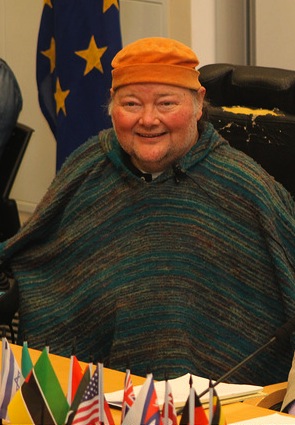
The staff and students of the CDLP are profoundly grieved by the passing of Martin Naughton – one of the pioneers of the disability rights movement in Ireland and Europe. He was a perfect gentleman with a strong sense of people and place. He left a huge imprint on the evolution of the disability rights community both in Ireland and in Europe. In particular, the Irish and European independent living movements owe him a huge debt of gratitude. We were extremely proud to appoint him an honorary professor at the University where his wisdom was shared so generously with staff and students. He regularly chaired sessions at our International Summer School – most recently with Senator Tom Harkin and Assistant Secretary of State Judy Heuman. He never lost his love for his native Connemara and the Irish language. We will miss him terribly and will seek to honour his memory by trying to carry on his life’s work as best we can.
Prof Gerard Quinn, Director.
August 2016 - Peter Lambreghts, RIP
The Centre for Disability Law and Policy is deeply saddened by the news that Peter Lambreghts, Senior Officer of the European Network on Independent Living, has passed away.
Peter was also co-chair of the European Expert Group on Deinsitutionalisation and worked closely with us in his capacity to build more inclusive societies. We admired Peter's energy and commitment to fight for the rights of persons with disabilities and to help them live in dignity in the community. Peter will be greatly missed by the entire European disability movement and our thoughts are with his family in these difficult moments.
Inspired by Peter's legacy, we will continue our work to close down all institutions across Europe and make independent living possible for all persons with disabilities. May he rest in peace.
Prof Gerard Quinn, Director.
June 2016 - UN CRPD Council of States Parties to the Convention NHRI Side Event
The video above is a side event at CRPD Council of States Parties discussing National Human Rights Institutions and Implementing the Convention on 14 June 2016. The event was organised and co-hosted by the Asia-Pacific Forum of National Human Rights Institutions (APF) and the Global Alliance of National Human Rights Institutions (GANHRI) and sponsored by the Permanent Missions of Australia, Germany, Ireland, Mongolia, Morocco and New Zealand. It features a discussion of NHRIs as a key part of the national and international monitoring with civil society. Professor Gerard Quinn speaks in his capacity as an independent expert at the 50min mark.
May 2016 - Irish Human Rights and Equality Commission launches CDLP report on CRPD
The UN Special Rapporteur on the Rights of Persons with Disabilities, Catalina Devandas Aguilar, launched a report, 'Article 33: Establishing a Monitoring Framework for the UN Convention on the Rights of Persons with Disabilities', on 9 May 2016. This evaluation report by Dr Eilionóir Flynn and Meredith Raley of the CDLP was commissioned by the Irish Human Rights and Equality Commission.
The report focuses on the role of the independent monitoring mechanism in Article 33, which will oversee the implementation process. The report provides a variety of suggestions and examples of good practice, which will be useful as Ireland prepares to ratify the CRPD. The monitoring mechanism in the CRPD is a unique innovation among human rights treaties, which makes its correct implementation both a challenge and extremely worthwhile. The full report can be downloaded as a PDF here - Building on the Promise of ESIF into the future-1st December roundtable report oand in a machine readable version: CRPD Machine readable Word version for Web
April 2016 - Follow the Money: Financing Independent Living in the Community
A CRPD Committee 15th Session side event, 'Follow the Money: Financing Independent Living in the Community'' took place in Room XXII, Palais des Nations, Geneva on 19 April. Organised by the Mental Disability Advocacy Centre (MDAC), Inclusion International and the CDLP, this this event which drew on the combined knowledge and expertise of advocacy organisations working internationally on the rights of persons with disabilities. It discussed questions such as 'How can personal independence payments contribute to a successful deinstitutionalisation plan?' and ' What are the legal implications of Article 19 for national budgets? How can international cooperation contribute to independent living in the community – and what happens when it goes wrong?'
Speakers included:
- Connie Laurin-Bowie, Executive Director, Inclusion International. “Deinstitutionalisation and gaining independence”
- Gerard Quinn, Professor of Law and Director of CDLP. “Putting your money where your mouth is – the legal obligations in Article 19”
- Emily Loughlin, PhD candidate at CDLP. “Independence for older persons”
- Kelley Johnson, Professor of Disability, Social Policy Research Centre, University of New South Wales. “The personalisation of financial and other supports – recent innovations from Australia”
- Oliver Lewis, Executive Director, MDAC. “International cooperation: The case of EU Structural Funds”
March 2016 - Eminent Visiting Professors from the US and Australia (March-May)


This March saw the return of two eminent academics and friends of the CDLP for extended stays. Professor Kelley Johnson, Centre for Social Policy, University of New South Wales, Sydney, Australia, is Visiting Professor at the CDLP until May. Professor Johnson has had a continuing interest in deinstitutionalisation, the barriers and facilitators to people with disabilities living good lives in the community, sexuality and relationships, and the UN Convention on the Rights of Persons with Disability. She has been joined at the CDLP for four weeks by Professor Michael Waterstone, Loyola Law School (LA, USA) visiting as a Fulbright Specialist to initiate a deeper exchange of research and ideas about how to successfully pursue a strategy of deinstitutionalization and community living for persons with disabilities on both sides of the Atlantic.
Together they gave a seminar “Community Living Policy Innovations in the United States & Australia” in the Institute for Lifecourse and Society on Tuesday March 15th 2016 at which they spoke about the new US Federal Agency for Community Living (which combines Federal monies to assist States to transition from institutions into community living arrangements for both older people and people with disabilities) and the new National Disability Insurance Scheme in Australia (NDIS) which seeks to personalise services to make community living a reality for persons with disabilities. View the video of the event here.
March 2016 - International Fellows Continue to Alight in Galway
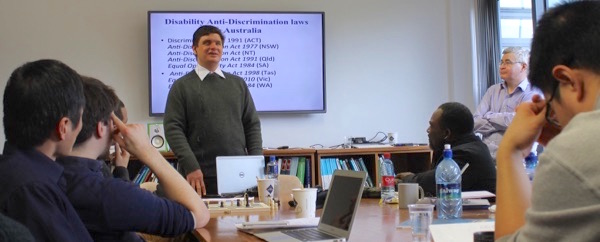
The Centre has enjoyed several visits from international fellows already this year. During their stays: Dr Paul Harpur, TC Beirne School of Law, University of Queensland held a seminar on :"Paradigm Shifts in Approaches to Reading Equality: The UN Convention on the Rights of Persons with Disabilities and WIPO’s Marrakesh Treaty” (above) and Dr Nancy E. Hansen, Director, Interdisciplinary Master's Program, Disability Studies, University of Manitoba, Winnipeg, Canada spoke on "Post-conflict experience of disabled people rebuilding for inclusion in policy or infrastructure.” (photo below).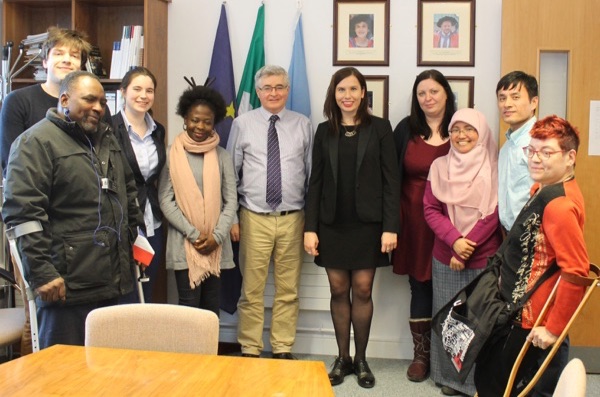
We look forward to continued visits this semester from luminaries including: Professor Michael Waterstone, Loyola Law School (LA, USA) on a Fulbright Specialist exchange and Professor Kelley Johnson, Centre for Social Policy, University of New South Wales, Sydney, Australia, as Visiting Professor to CDLP.
February 2016 - Community Living for All – EU Structural Funds Watch
In partnership with Lumos the CDLP are excited to announce a new project monitoring the use of the European Structural and Investment Funds to ensure community living for all.
The project will conduct research and support advocacy focused on the positive potential of the Funds in preventing institutionalisation. Its research will also focus on the ways in which EU Member States can transition away from institutional care to community-based living and services.
The project will be guided by a Steering Committee comprised of organisations active in advocating for a change in the EU Regulations governing the Funds. This group will hold its first meeting on Tuesday the 16th of February in Brussels and looks forward to launching its website and sharing its work widely in the coming year.
February 2016 - "Election 2016: A New Government – A New Disability Reform Agenda" Reflections from the Centre for Disability Law & Policy at NUI Galway (9 February, 2016)
The hard-won economic recovery is now well underway. The Government deserves credit for this. But we now need a social recovery to match it – one based on the equal citizenship as well as productive capacity of persons with disabilities. All political parties need to address these reform challenges and show the voters they mean it. Otherwise they cannot claim the support of citizens with disabilities who have had to put up with a lack of innovation, bad services and low expectations. We – at the Centre for Disability Law & Policy at NUI Galway – contend that those who contend for high office have to provide convincing plans to meet the following challenges.
First of all, our service model needs a drastic overhaul. It is still premised on a medical model of allocating resources to meet specific needs. These needs are important. But they should be put alongside the higher importance of enabling people to get a life and live independently and in the community. When the present Government came into office it promised a radical shake-up of the way the public service functions. Nothing of the sort has happened. We are left with the same unfit-for-purpose service model – the only difference being that it now has a static or shrunken budget. The stated goal of successive Governments has been in favour of the personalization of supports with budgets devolved to the person (and freedom to shop beyond traditional service providers). While we pour money in to an old and discredited model the world has moved on. Australia’s National Disability Insurance Scheme is particularly impressive. Some services are innovating. But isolated pockets of excellence simply aggravate people’s frustration. Someone, somewhere in public office has to grasp the public interest and enforce it throughout the country. All parties should declare now their intention to forcefully re-engineer our existing service model and transform it to meet best international practice.
Secondly, the endemic poverty of persons with disabilities has to be tackled. Everyone knows that employment is a key to independence as well as social integration. The recently announced Employment Strategy is a good start. But we also know that employment for many people with disabilities will not necessarily generate the resources needed to get a life. And our social welfare system on its own will not do. It needs to be complemented by positive wealth accumulation strategies particularly in favour of persons with disabilities and especially those with intellectual disabilities. There is a lot of fiscal innovation throughout the world now which enables trust and other funds to grow in favour of persons with disabilities without impacting their social entitlements (e.g., Canada). Often this requires Government to incentivize third parties to invest (with appropriate tax breaks). There is no reason why the Department of Finance cannot innovate beyond the well-known limits of our social welfare model. There is no reason why we cannot break beyond the assumption that people with disabilities will either remain resource-poor or dependent on social welfare (more or less the same thing). Our political parties need to commit to innovative with new fiscal models to grow the assets of persons with disabilities to ensure they have choices and do not fall into steep poverty traps.
Thirdly, any new Government needs to accelerate the implementation of the long-standing plan to end institutionalization. The main scandal about Aras Attracta was that it still exists. Its continued existence is not merely an affront to the right to live in the community but is also against longstanding Government policy (“Ending Congregated Settings”, HSE, 2011). It is time to get serious about community living which means connecting housing strategy with services and support strategy. It means, for example, getting beyond a reactionary or response–led service model that cannot plan for inevitable lifecourse events. What is the point in being allocated housing if one doesn’t have the support to take advantage of it? No one can rationally plan their lives if they cannot predict how the system will respond in advance. And carers have a right to live independently too instead if being used as a permanent form of support regardless of the opportunity costs to them – and to the larger economy.
This Government managed to turn around a backward looking Bill it inherited from the last Government on mental capacity. Minister Kathleen Lynch deserves the lion’s share of credit for converting this Bill into Europe’s first Assisted Decision-Making Act (December 2015). The Act is far from perfect but at least we now have something to build on. This Act has yet to be commenced. This has to be a priority of the incoming Government. And even when commenced it will remain symbolic unless people are also enabled to get their own lives. That is another reason why action on closing own institutions is long over-due.
The next Government could start by ratifying the UN Convention on the Rights of Persons with Disabilities. Rather shamefully, we are among only a handful of countries that have not ratified. We have to ratify with an attitude that we can contribute to positive strategies for change throughout the world – and not just defend ourselves every four years before the UN. The imagination shown by this Government to produce landmark legislation on Assisted Decision-Making shows what is possible. The next Government has to show similar imagination in changing our service model, tackling poverty through innovation and ensuring community living for all. Indeed, strong legislation on the right to live in the community would be an ambitious but also an achievable goal.
Otherwise, given the Poor Law mentality behind so much of our model, one is left wondering what 1916 was all about and whether it was worth it.
Professor Gerard Quinn, Director
Professor Martin Naughton, Adjunct Chair
Dr Eilionoir Flynn, Assistant Director
February 2016 - Upcoming Research Seminar & Reception
Winner of the CDLP Gold Medal for Excellence 2016, Milika Sakala will be speaking on “The Potential of the African Disability Protocol as an Instrument to Advance Disability Rights in Africa” at 11am, Friday 10 February in the CDLP Boardroom, ILAS Building, followed by a reception at 12.15pm. All are welcome!
February 2016 - Research Associate / Postdoctoral Researcher – ERC VOICES
Applications are invited from suitably qualified candidates for a full-time fixed term position as a Research Associate / Postdoctoral Researcher with the Centre for Disability Law and Policy at the National University of Ireland, Galway. This position is funded by the European Research Council and the Centre for Disability Law & Policy at the National University of Ireland Galway. It is available from March 2017 to contract end date of 30th November 2018. Closing date for receipt of applications is 3.00 pm on Friday, 3rd March 2017.
January 2016 - Developing Disability Rights in China: From Paper to Practice? Conference
A conference entitled 'Developing Disability Rights in China: From Paper to Practice?' took place on Friday, 15 January 2016 at the University of Leeds. This event was organised jointly by the Centre of Disability Law & Policy and the Centre for Disability Studies, University of Leeds, UK (CDS) and China Vision, UK. Please also consult the programme outline: Developing Disability Rights in China - Conference Outline
The event sought to raise awareness of current initiatives and challenges experienced by disabled people and their organisations and advocates in China and to generate opportunities for on-going collaboration and exchange – eg in relation to research, learning and teaching, and advocacy and activism.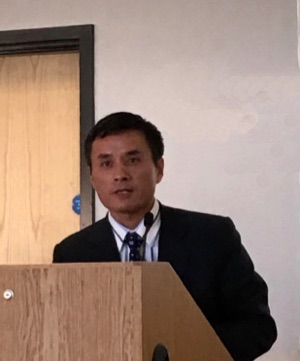
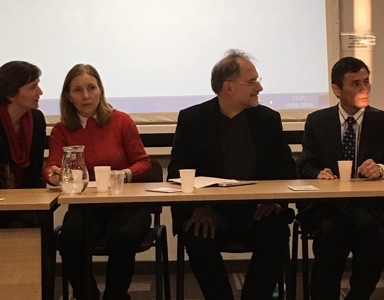
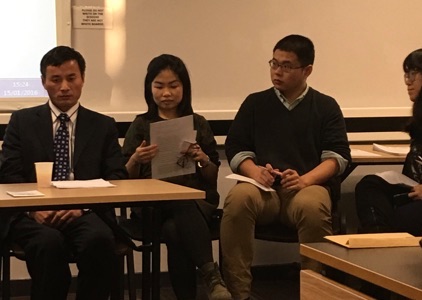
Photos above, left to right: 1) Mr Zhijun Fu (LLM student at CDLP) speaking at China Disability Law Conference in Leeds; 2) Panel discussion including Mr Stephen Hallet (3rd from right) of China Vision and 3) Mr Zhijun Fu (left) and Mr Chen Bo (right) (LLM & PhD students at CDLP).
January 2016 - EU PERSON Project’s Submission to the Council of Europe’s Oviedo Bioethical Convention
The CDLP, working with our partners on the PERSON project, submitted this detailed analysis - EU PERSON Project’s Submission to the Council of Europe’s Oviedo Bioethical Conv- on the proposed changes to the Council of Europe's Oviedo Bioethical convention. The call for submission related to proposed additional protocols on involuntary detention and treatment of people in psychiatric services. We point out where it fails to meet the standard of mental health care we can expect once services respect the Convention of the Rights of Person's with Disabilities.
2015 Archive
December 2015 - Quinn delivers talk on ‘From Civil Death to Civil Life - Perspectives on Supported Decision-Making for Persons with Disabilities’ in Tbilisi State University, Georgia
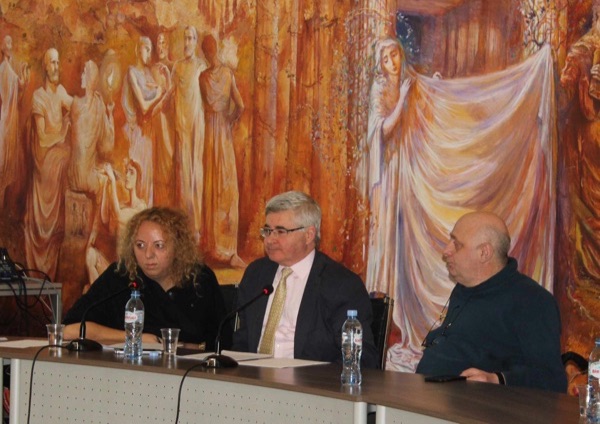
Prof Gerard Quinn gave a talk on ‘From Civil Death to Civil Life - Perspectives on Supported Decision-Making for Persons with Disabilities' in Tbilisi State University,Georgia on 20 December, 2015. The full paper can be downloaded here: From Civil Death to Civil Life - Perspectives on Supported Decision-Making
December 2015 - Quinn preps a Moot Court Team in Batumi, Georgia
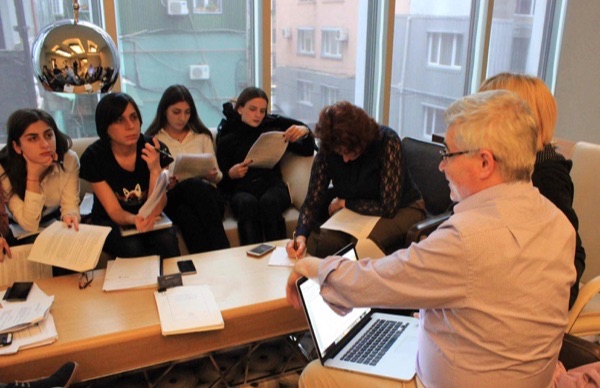
October 2015 - Quinn delivers keynote at Irish Disability Studies Associations, UCD Dublin, on the process of change in Ireland
On Friday last, October 9th 2015, the Irish Disability Studies Association (IDSA), the Centre for Disability Law and Policy (CDLP) and the UCD Centre for Disability Studies at University College Dublin hosted a half-day research seminar showcasing some highly innovative research currently being undertaken in Ireland. The event was held at University College Dublin and attracted more than eighty participants.
Professor Quinn commenced the seminar with a keynote address entitled 'All Power to the People – Why Change on Disability Policy is so Slow in Ireland'. Prof. Quinns speech addressed the relationship between ideas, knowledge and research with the process of change. Martin Naughton from the Disability Federation of Ireland responded to Prof. Quinn's keynote address, which can be read here: Keynote at Irish Disability Studies Associations.
September 2015 - Centre for Disability Law and Policy leads call to Irish Government to amend new capacity legislation relating to provisions on decision-making ability of people with disabilities
You can download the full press release in PDF (Human Rights Concerns for Capacity Law Bill) or Word (Human Rights Concerns for Capacity Law Bill) versions.
September 2015 - Disability Rights Scholarship Program
The Disability Rights Scholarship Program provides awards for master’s degree study to disability rights advocates, lawyers, and educators to develop new legislation, jurisprudence, policy, research, and scholarship to harness the innovations and opportunities offered by the United Nations Convention on the Rights of Persons with Disabilities (CRPD). Find out more on their website.
August 2015 - Quinn delivers keynote at the Queensland Council on Social Services (QCOSS) on a Bill of Rights for Queensland
Supported by QCOSS, Anti-Discrimination Commission of Queensland, the Queensland Public Advocate, Queenslanders with Disability Network, and Griffith University, a day long workshop on 'Marginalised Queenslanders influencing public policy workshop' provided a valuable insight into how marginalised Queenslanders can influence public policy from a number of different perspectives. The day began with a keynote address by Professor Gerard Quinn. Professor Quinn's talk about restoring the Human in human rights and how marginalised populations can influence public policy is available here: Keynote at the Queensland Council on Social Services
August 2015 - Supported Decision Making Debate (University of New South Wales, Australia)
Professor Gerard Quinn and Centre alumni Dr Anna Arstein-Kerslake took part in a lively debate debate on Supported Decision Making in Sydney this week. The debate was hosted by the social Policy Research Centre at the University of New South Wales, at which Prof Quinn is a visiting professor. Listen back here: https://www.sprc.unsw.edu.au/event/sprc-social-policy-debate-supported-decision-making/
August 2015 - Professor Quinn Down Under
Professor Gerard Quinn was invited on Australian radio to discuss independent decision making with long-time Centre associate Professor Rosemary Kayess, University of New South Wales Sydney, Australia. Listen back here: http://www.2ser.com/component/k2/item/17249-decisions-of-the-disabled
August 2015 - UN Special Rapporteur among Adjunct Appointment
The new UN Special Rapporteur on the Rights of Persons with Disabilities, Ms Catalina Devandas, is among three new adjunct appointees to the Centre. Since taking office in December 2014, Ms Devandas has engaged the Centre as a key institutional support in carrying out her mandate as Rapporteur. The formal appointment of Ms Devandas as Adjunct Professor at the Centre underlines this collaboration.
Also appointed as Adjunct Professors to the Centre have been Mr Martin Naughton and Ms Gráinne McMorrow SC.
Mr Naughton is one of Europe’s leading figures in the campaign to secure community living for the estimated 1.3 million European with disabilities who still live in institutions. He is executive co-chair of the European Network on Independent Living (ENIL). Ms McMorrow is Ireland’s representative on the prestigious Council of Europe’s European Council’s Venice Commission and is among Europe’s top jurists who advise world governments on how to enshrine the rule of law into their legal systems and constitutions. She is a senior member of the Irish Bar.
July 2015 - Universal Periodic Review Consultations
The Irish Council for Civil Liberties (ICCL), in partnership with the Irish Human Rights and Equality Commission (IHREC), as Ireland’s national human rights institution, is hosting a series of human rights consultations around Ireland. This is an opportunity for you to have your voice heard and share information about human rights issues on the ground in Ireland. Your voice can help to influence the outcome of the UPR. Read more (PDF flyer - Universal Periodic Review Consultations) and join us at one of our consultations:
When: July 16th, 14:30-16:30
Where: ILAS Building
What: For more information about the Universal Periodic Review visit: http://www.rightsnow.ie/
June 2015 - Civil society organisations comment as Assisted Decision-Making Bill passes Committee Stage
The Assisted Decision-Making (Capacity) Bill entered committee stage yesterday (Thursday, 18 June, 2015) and came one step closer to becoming law. Over four hundred proposed amendments were motioned and debated by the Select Committee on Justice, Defence and Equality. A number of civil society organisations in Ireland felt that the Select Committee could have gone further to more fully secure the rights of older citizens and those with disabilities.
Professor Gerard Quinn, Director at the Centre for Disability Law and Policy (CDLP) at NUI Galway, stated that: “Our Centre has joined with a coalition of over 15 organisations representing people with disabilities and their families, older persons, mental health service users, and health professionals, to contribute to the development of the Bill. The coalition is pleased with the strong public consultation of the Department of Justice and Equality in the development of the Bill. But we remain concerned that the Department may have missed an opportunity to fully harmonise the Bill with current human rights standards.”
Sarah Lennon from Inclusion Ireland stated that: “We are pleased overall with the commitment of the Department of Justice and the Justice committee to making this law responsive to the needs of Irish citizens. The sheer number of amendments reflected the extensive consultation with civil society organisations representing experts through experience in the development of the Bill. We want to continue working with the Department to create robust mechanisms truly harmonise the Bill with international human rights standards.”
Dr Eilionóir Flynn, the Deputy Director of the CDLP stated that: ’The repeal of the “wards of court” system has been a long time coming. The Ministry for Justice has rightly consigned the 1871 Lunacy Regulation Act to the dustbin of history. But there is a risk that residues of the old-style paternalism have remained. In particular, the Bill places too much emphasis on a person’s mental capacity. We don’t want a situation where people with disabilities and older persons are forced to get a mental capacity assessment to enter into support agreements under the Bill. Under the Bill a person will be ineligible to appoint an assistant for a decision if the person is seen to lack mental capacity. Yet the whole point of the Bill was to provide support arrangements precisely for people who would otherwise fail outdated and discriminatory mental capacity assessments. This shift is required under international human rights law. The UN Committee on the rights of Persons with Disabilities has been clear: mental capacity assessments must go.”
Jim Walsh, of the Irish Advocacy Network, expressed concern that: “Assessing capacity will become the focus rather than understanding and facilitating individual support needs. Statutory bodies concerned with training care staff, we fear, will focus on how to question someone’s capacity rather than helping staff to address social support needs and support a person’s decision making.”
Some mental health advocates are also concerned that the new advanced healthcare directives will be useful for physical health problems but will apply unequally to mental health service users. Fiona Walsh of Tallaght Trialogue commented that: “Physical health and mental health issues must be given equal respect. Under the current Bill, not even a government minister could make an Advance Healthcare Directive which would be respected in the event of a mental health crises that leads to involuntary treatment under mental health law.”
Another area of concern related to informal decision-making powers. The term 'informal decision-maker' was removed in yesterday’s committee stage. However, advocates remain concerned that some of the troubling aspects of the provisions remain in place.
Tina Leonard, Head of Advocacy and Public Affairs at The Alzheimer Society of Ireland, said: “The Minister for Justice rightly removed some of the excessive power inadvertently granted to informal supporters of people who believed that the person they were supporting lacked mental capacity. That provision would have allowed, for example, an older person to be placed in a home against their wishes simply because their adult child 'believed that the person lacked mental capacity'. Instead, we need to secure people’s dignity to take risks. But although the language has changed after the Minister’s recent amendments, we are concerned that some of these 'informal powers' remain in place. It is not enough to simply remove the term 'informal decision–maker' if the excessive powers remain the same.”
Professor Quinn concluded: “All of us are shaped by the balance of protection and autonomy in law. The legal requirement to wear seatbelts is an example showing where autonomy ends and public protection begins. But the current Bill seems to say that for people with disabilities and older people, different rules apply in striking that balance. We need to move beyond 'special laws' for people with disabilities, just as we’re moving away from 'special schools' and 'special day programs'. True integration requires a commitment to equality.”
May 2015 - CDLP host coffee morning in aid of the disabled victims of the Nepal earthquake
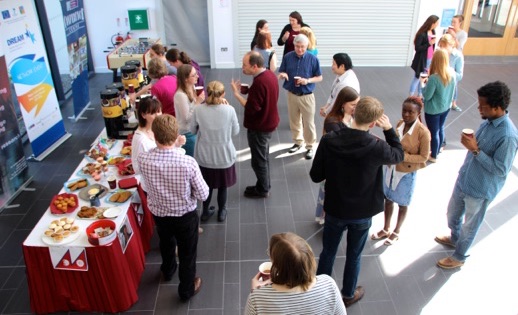
The Centre for Disability Law and Policy has hosted many master's students from Nepal over recent years with support of the Soros Opens Society Foundation. They all live in Nepal and have survived. Most of them work with disability organisations and report severe difficulties for people with disabilities in the aftermath of the recent earthquake. The monies raised by this coffee morning will go directly to the disability groups they work with in order to show solidarity and alleviate at least some of the worst effects of the quake. Of especial importance now is to make sure the voice of people with disabilities is listened to as Nepal struggles to re-build a more inclusive society and economy.
April 2015 - EU Access to Justice - Ireland Country Report launch
The Centre will launch a Country Report on Ireland as part of an EU-funded project on Access to Justice for Children with Mental Disabilities, in Dublin on 23 April 2015. See this flyer ( PDF - EU Access to Justice Flyer / Word - EU Access to Justice Flyer) for further details. You can also download the report in PDF - EU Access to Justice Report - and Word versions - EU Access to Justice Report.
April 2015 - Campaign to Act
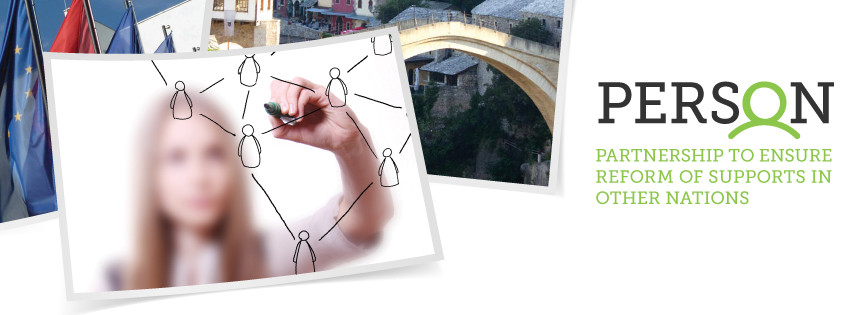
The Centre, as co-ordinator of the EU PERSON project, has launched a campaign to push governments, private entities and individuals to implement Article 12 of the UN Convention on the Rights of Persons with Disabilities. It’s time to act. Go to our campaign website www.righttoactcampaign.com
March 2015 - CDLP leads coalition of NGOs to call for urgent reform of Irish legal capacity law
Today, on the eighth anniversary of Ireland's signature of the UN Convention on the Rights of Persons with Disabilities, the CDLP, in conjunction with 17 NGOs in the fields of disability, mental health and ageing, call on the Irish government to repeal the Regulation of Lunacy (Ireland) Act 1871 and immediately bring the Assisted Decision-Making (Capacity) Bill 2013 to Committee stage in the Dail. See this press release for further information: Call for urgent reform of Irish legal capacity law
March 2015 - Article: 'Ireland must ratify UN Convention on Rights of People with Disabilities'
Meredith Raley, a PhD candidate at the CDLP, co-authored a piece with Gary Lee from the Centre for Independent Living on the need for Ireland to ratify the UN Convention on the Rights of People with Disabilities in today's (30 March 2015) Irish Times.
March 2015 - Likando Kalaluka appointed as Attorney General of Zambia
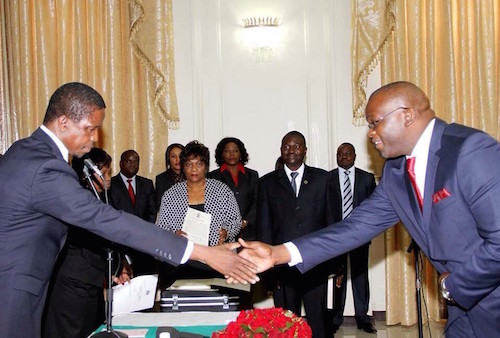
Likando Kalaluka, a graduate of the first ever class of the LLM in International and Comparative Disability Law and Policy in 2012, has been appointed as the Attorney General of Zambia. Pictured above are Mr. Likando Kalaluka (right), being sworn in as Attorney General of Zambia by Republican President of Zambia, Mr. Edgar Lungu.
February 2015 - CDLP success in Irish Research Council 'New Foundations' Awards Scheme

The research team at the CDLP have successfully obtained a grant to host a series of events to explore the options of piloting a Community Café that employs people with disabilities for the new ILAS ( Institute for Lifecourse and Society) building at NUI Galway.
In 2014, the Institute for Lifecourse and Society (ILAS) opened. The building is intended as a community space and has the capacity to feature a café that caters for staff, students and visitors.
The aim of this project is to work with community partner, EmployAblity Galway, to organize a series of events. During these, students, staff and community partners will engage and together explore options to initiate the setting up of a café that employs and is run by people with disabilities. The focus will be on social innovation and how to set up a social enterprise.
2014 Archive
December 2014 - Major ERC funding success for Dr. Eilionóir Flynn and CDLP
Dr. Eilionóir Flynn has been approved by the European Research Council (ERC) almost €1m in funding for her groundbreaking VOICES project. VOICES aims to make visible the experiences of people with disabilities who have been denied legal capacity.
Dr Flynn is the youngest of the ERC Starter grantees this year and amongst nine in Ireland to win a total of €11m in funding under these prestigious awards. Her award of almost €1m in funding for the ground-breaking VOICES project will run for three and a half years.
The VOICES project aims to make visible the experiences of people with disabilities who have been denied legal capacity. It will involve a series of workshops where people with this lived experience will be paired with social and legal scholars to develop their narratives, and construct critical responses to these narratives, for inclusion in an edited collection at the end of the project. Particular themes to be addressed include criminal responsibility, consent, and contract law.
Dr Flynn said "The VOICES project will take a radical approach to develop new law reform ideas based on the concept of “universal legal capacity”, a basic human freedom to make one’s own decisions and have them respected by law. People with disabilities will be supported in this project by legal and social science scholars to develop personal narratives about their experiences in exercising, or being denied, legal capacity. This is important because many people with disabilities, especially people with intellectual, psycho-social and other cognitive disabilities, have been denied this fundamental right – informally, in the private sphere, and formally, in the public sphere through states’ laws and policies."
December 2014 - CDLP Director honoured in US with Senator Harkin
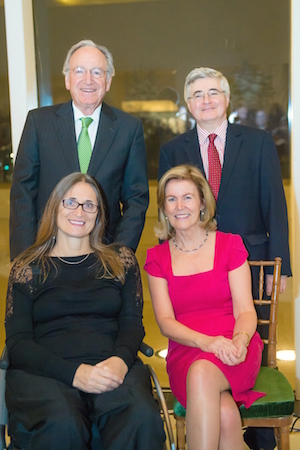
Professor Gerard Quinn was honoured alongside Senator Tom Harkin by the United States International Council on Disabilities in recognition of his work in the field of international and comparative disability law and policy. The ceremony took place in Washington on the eve of the international day of people with disabilities, December 2nd 2014. Download Professor’s Quinn’s speech here: CDLP Director speech For more info: http://www.usicd.org/template/index.cfm
Caption: Back row: US Senator Tom Harkin with Professor Ger Quinn, Director of the Centre for Disability Law and Policy.
Front row: Marca Bristo, former chair of the US National Council on Disability and outgoing chair of the US International Council on Disability; Her Excellency Anne Anderson, Ambassador of Ireland to the US
December 2014 - Launch of groundbreaking book on Genetic Discrimination
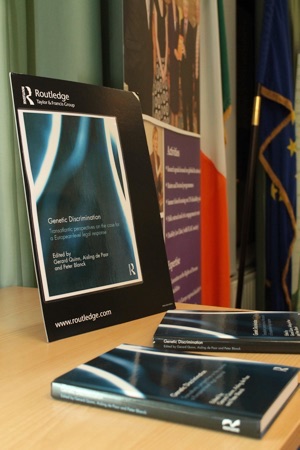
MEP Marian Harkin and members of the judiciary, as well as leading figures from the areas of disability and genetics joined on Friday night, 12th December, at the European Commission Representation to celebrate the launch of Genetic Discrimination – Transatlantic perspectives on the case for a European-level legal response. The book is edited by Professor Gerard Quinn, CDLP alumna Dr Aisling de Paor (DCU) and Professor Peter Blanck (Burton Blatt Institute, Syracuse University, USA) and focuses particularly on the legislative and policy framework in the European Union emphasising gaps in protection and the scope for specific legislative action in the area of genetic discrimination. Download Professor’s Quinn’s speech here: Launch of genetic discrimination book
December 2014 - CDLP First Official Engagement for the New Special Rapporteur on Disability
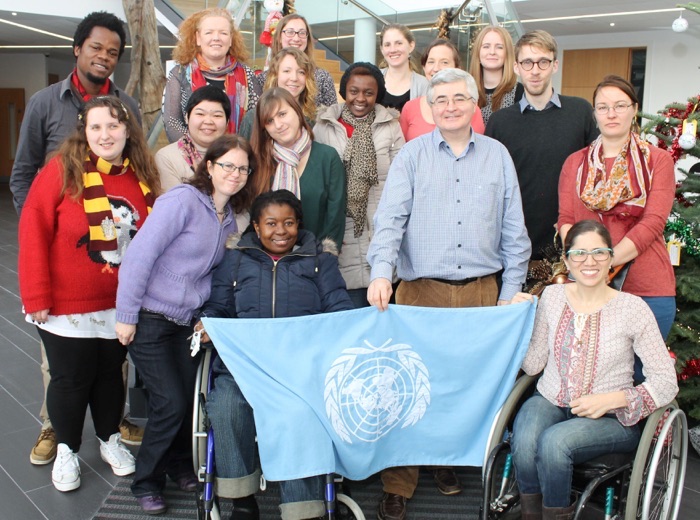
Catalina Devandas with staff and students of the Centre for Disability Law and Policy
November 2014 - Orientation Day at the new Institute for Lifecourse and Society
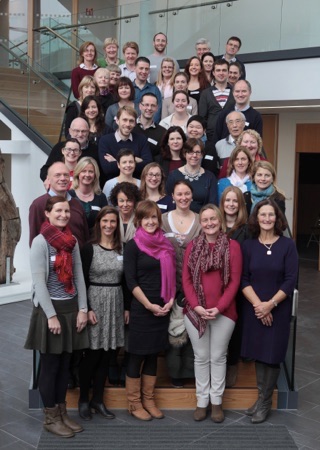
Staff and students of the new Institute for Lifecourse and Society gathered for an orientation day at its newly opened building in the north campus in November 2014. The formal launch of the Institute building will take place in early 2015.
November 2014 - Leading Chinese disability advocate Xie Bin visits the Centre for a seminar and meeting with staff and students
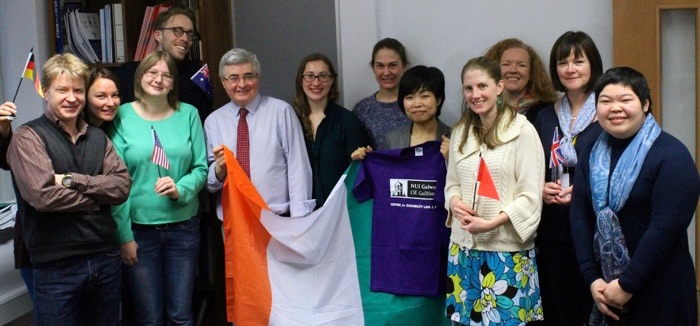
Leading Chinese disability advocate Xie Bin with CDLP staff and students
July 2014 - NUI Galway Women's Global Studies Program Conference
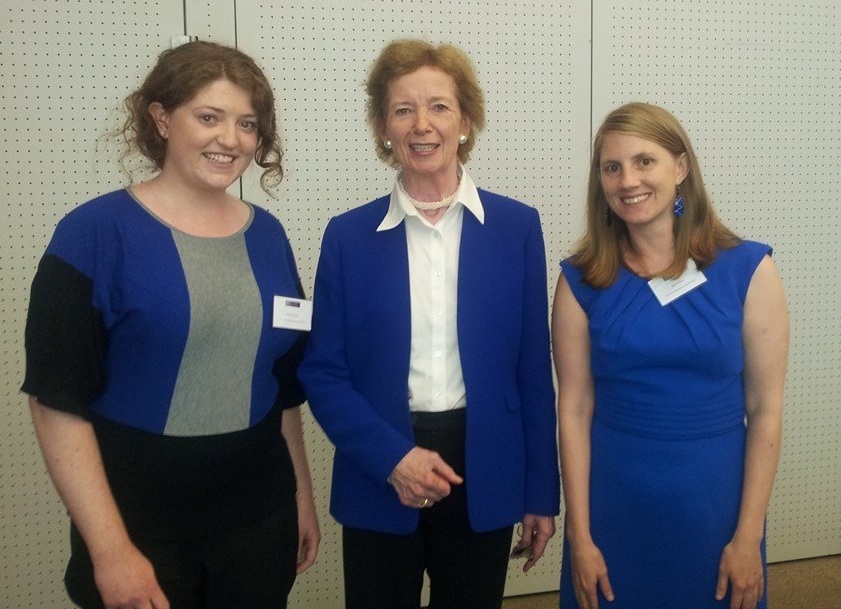
The Centre’s Jenni Kline and Áine Sperrin with former President of Ireland Dr Mary Robinson at the NUI Galway Women's Global Studies Program's conference on Women's Leadership, Peace, and Sustainable Livelihoods in the Democratic Republic of the Congo and the Region. Jenni and Áine presented a paper "Inclusive Response, Reconciliation and Rebuilding-the potential impact of the CRPD on women in the DRC”.
June 2014 - DREAM Conference
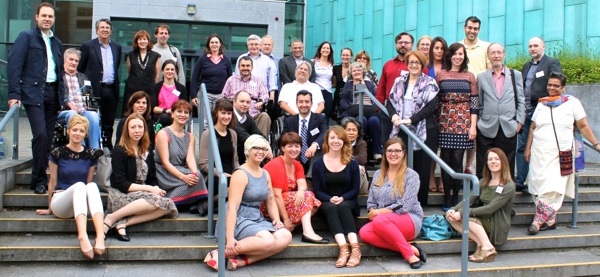
The final conference of the EU Marie Curie Disability Rights Expanding Accessible Markets (DREAM) project took place in June 2014. Minister Kathleen Lynch opened the event and EU Research Commissioner Máire Geoghegan-Quinn and US Senator Tom Harkin presented via video link. The conference marks the final stage of this €3.7m project. Photographs of the event can be found on Flickr.
June 2014 - Quinn features in EU Marie Curie promo
As Principal Investigator for the CDLP DREAM network, Professor Quinn features in this video above by the Irish University Association aimed at publicising Marie Curie actions.
May 2014 - CDLP welcomes EU Ombudsman Move to Investigate EU Structural Funds
The CDLP greatly welcomes the initiative by the EU Ombudsman to investigate the use of the EU Structural Funds for its compliance with human rights standards including the EU Charter for Fundamental Rights. The CDLP together with many others including LUMOS, the EDF and Age Platform Europe, have done much to highlight current deficiencies and future possibilities of the Funds to transition people from institutions into appropriate community living arrangements. The Director of the Centre, Professor Gerard Quinn said: “as taxpayers we have a right to demand that our monies are being spent in a way that maximizes community living for all. That after all, is the very best possible use of Structural Funds. We hope the investigation shows how the Funds can better be used in the future to avoid and close institutions and create a better social Europe for all.
Link to announcement of the EU Ombudsman: http://www.ombudsman.europa.eu/en/press/release.faces/en/54420/html.bookmark
May 2014 - National Platform of Self Advocates
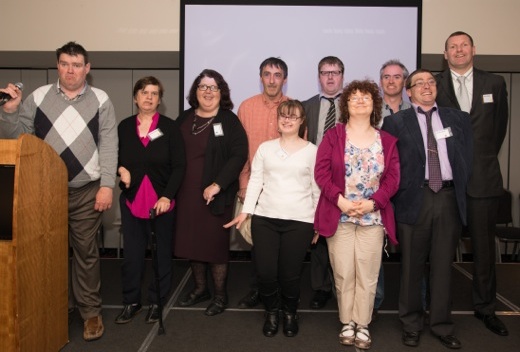
On 29 May 2014 the National Platform of Self Advocates hosted its first national conference in Croke Park, Dublin. Senator Katherine Zappone opened the conference which was attended by over 120 self advocates.
The keynote speech was delivered by a representative from People First Scotland. They explained how they set up more than 20 years ago. After presentations from the Interim Steering Committee Members on the Platform's history and on the group's draft Vision Statement, elections to the new Committee were held.
Pictured above are the new committee elected for 3 years.
May 2014 - CDLP PhD Student Wins Major International Prize
The Centre for Disability Law & Policy at the National University of Ireland (Galway) congratulates Magdi Birtha on becoming he first ever recipient of the international Carla Vlaskamp early career award. The award is is given in recognition of the lifetime achievements of Professor Vlaskamp (University of Groningen) in placing a focus on the voice and rights of persons with profound intellectual disabilities. It enables a young researcher to present at the World Conference of the International Association for the Scientific Study of Intellectual and Developmental Disabilities (IASSIDD). Magdi is a Marie Curie PhD Research Fellow at the Centre on its DREAM project which is a collaborative network shared with six other European universities and institutes. Magdi’s PhD research focuses on the conditions necessary to ensure effective participation of persons with disabilities and their representative organisations in policy-making processes and national monitoring processes under the UN disability treaty. She has a special focus on the most marginalized parts of the disability movement including persons with profound intellectual and multiple disabilities.
Commenting on her award, the Director of the Centre – Professor Gerard Quinn said: “Considering the outstanding achievements of Professor Vlaskamp this is a high honour indeed for Magdi. Magdi is a great ambassador for the DREAM Marie Curie network and for the thinking behind the EU Marie Cure programme which excels at giving young researchers a chance not merely to learn but also to put that learning to good use.”
April 2014 - Asia Pacific Forum NHRI Manual
The Asia Pacific Forum (APF) of the International Coordinating Committee (ICC) of National Human Rights Institutions (NHRIs) has commissioned the Centre for Disability Law and Policy at the National University of Ireland in Galway to develop a manual for NHRIs concerning their role, responsibilities, activities and practices in protecting and promoting the rights of persons with disabilities. See the the website set up for the project here: http://nhrisanddisabilityrights.wordpress.com/
April 2014 - Article 12 General Comment Adopted and CDLP Staff Thanked
Centre for Disability Law and Policy (CDLP) staff members Dr Eilionoir Flynn (Deputy Director, Senior Lecturer) and Anna Arstein-Kerslake (DREAM Research Fellow) were thanked by the United Nations Committee on the Rights of Persons with Disabilities today for their assistance and support drafting the General Comment on the Right to Equal Recognition Before the Law (Article 12). The General Comment was adopted today, 8 April 2014, and it is the first general comment adopted by the Committee. It clarifies the state obligations and individual rights in Article 12 CRPD, including the right to equal recognition before the law, the right to legal capacity, and the state duty to provide access to support for the exercise of legal capacity. The General Comment provides a groundbreaking description of these rights and duties, which will be used as the basis for examining state party compliance with Article 12. The final version will be available shortly on the website of the CRPD Committee.
March 2014 - LLM students organise Disability Awareness Week - Access All Areas
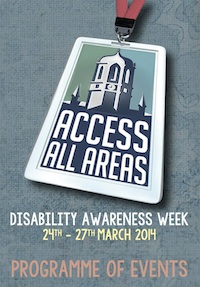
The Centre for Disability Law and Policy and the Disability Support Service are delighted to support its LLM students in hosting a Disability Awareness Week - Access All Areas at NUIG. This week will highlight and promote Inclusion, Accessibility and Diversity around NUI Galway.
The week will run from 24th – 27th March and there are a range of activities planned. For the full programme see the website.
February 2014 - Prof Gabor Gombos Leads Historic Week of Intensive Teaching on Legal Capacity
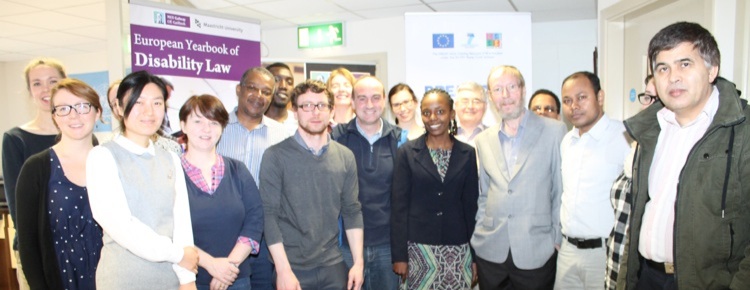
February 2014 - MEP visits Centre
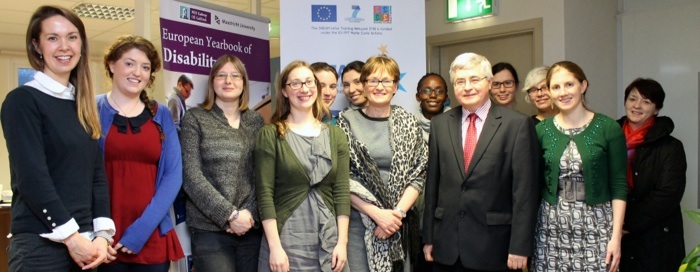
Ms Mairead McGuinness MEP, a supporter of and collaborator with the Centre, dropped by for visit in February to catch up on our activities. She is pictured (7th from left) with staff and students during the visit.
January 2014 - Seminar: Access to Justice and Reform of Legal Aid

The Disability Legal Information Clinic and NUI Galway Free Legal Advice Centre hosted a seminar on Access to Justice and Reform of Legal Aid on 29 January 2014. Speakers included (as pictured below) Judge Mary Fahy, Tom O’Malley (NUIG) Teresa Blake BL, and Lawrence Donnelly (NUIG) and the event was attended by 80 students, researchers and practitioners.
January 2014 - InAugural Indo-Irish Encounter on Legal Capacity
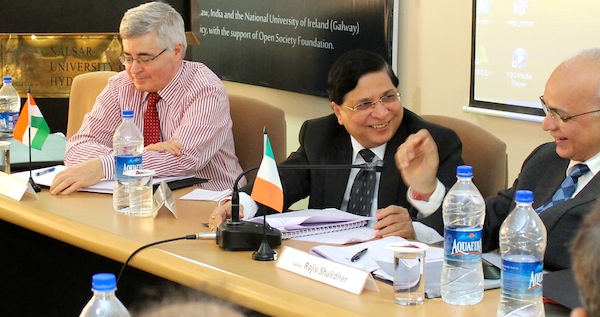
The first ever India and Ireland ’Policy Encounter’ on disability law and policy. was held on 17th and 18th January 2014 at NALSAR University of Law, Hyderabad, India. NALSAR is India’s No 1 Law School. The encounter was a joint project of NALSAR University of Law, India and the National University of Ireland (Galway) Centre on Disability Law and Policy with the support of the SOROS-Open Society Foundations.
Its focus was law reform Bills on legal capacity going through our respective Parliaments. The encounter brought together key players and figures from both countries’ legal and political systems to reflect together on commonalities and shared problematics in moving toward supported decision making in place of guardianship. Stakeholders from across the board were represented at the meeting – persons with disabilities and their representative organizations, judges, members of parliament, civil servants, academics, researchers and law students. The result was two days of common reflection on the shared journey of legal capacity law reform, challenges faced, lessons learnt and possibilities for the future. It was judged a huge success by all and the basis of a Memorandum of Understanding between the two institutions was agreed for formal development.
For Full Programme see here: Indo-Irish Encounter on Legal Capacity
2013 Archive
November 2013 - LLM Students Receive Gold Medal
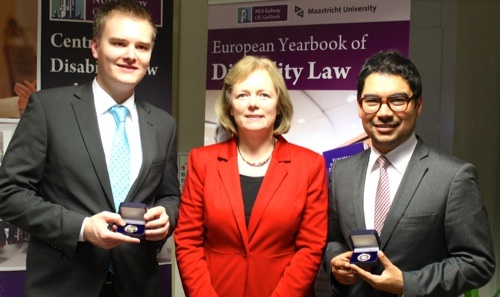
Pictured above are LLM Graduates Alberto Vasquez Encalada and Thomas Bernhard, joint awardees of the CDLP Gold Medal for Excellence, on their graduation day with Dr Lucy Byrnes, Dean of Graduate Studies.
They are joined below by Prof. Gerard Quinn, Director of the CDLP, and Shivaun Quinlivan, Programme Director of the LLM in International and Comparative Disability Law and Policy.
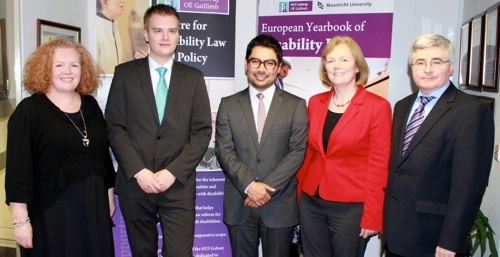
November 2013 - European Commission highlight the work of Early Stage Researcher
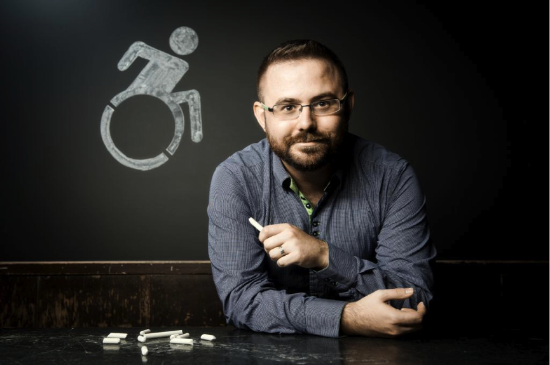
The European Commission have highlighted the work of Robert Huffaker on their LinkedIn page. The piece reads:
"Meet Robert Huffaker, Marie Curie Actions Fellow of the week! This American Fellow, living in Madrid, is conducting a cost benefit analysis of countries & companies including eAccessibility into their economic policies. "eAccessibility means ensuring that people with disabilities are not excluded from the use of ICT goods & services, i.e. websites, information kiosks, ATMs or mobile apps. Our project title -DREAM (Disability Rights Expanding Accessible Markets)- is spot on because since Day 1, it's been a dream for me." More about MCA programme: http://lnkd.in/djZgSiF
Robert is a Marie Curie Research Fellow and PhD candidate at the Centre for Disability Law and Policy at National University of Ireland, Galway.
November 2013 - First African Yearbook on Disability Rights
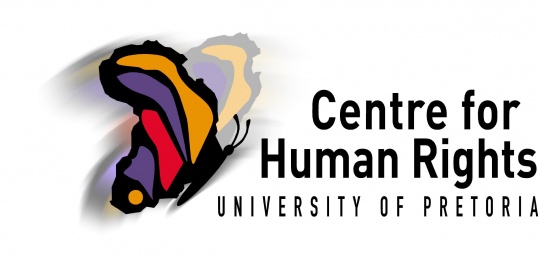
An inaugural African Disability Rights Yearbook, modeled on the CDLP's European Yearbook, has just been launched by the Centre for Human Rights at the University of Pretoria. It is available free African Yearbook on Disability Rights. The Yearbook was sponsored by the Open Society Initiative for Southern Africa and features articles by CDLP staff and alumni: Magdi Birtha, Elizabeth Kamundia and Likando Kalaluka.
November 2013 - CDLP Radio Documentary
Listen below to a short radio documentary on the CDLP produced by Céimin Burke, a Masters student in Journalism, which features interviews with current students and alumni.
November 2013 - Former CDLP students speak at Disability Rights Conference in South Africa

Innocentia Mgijima (pictured above, left) who is due to graduate from the LL.M. in International and Comparative Disability Law and Policy this month, spoke at the "Disability Rights in Africa Conference - Overcoming obstacles: towards the effective implementation of the CRPD in Africa" This conference was held in the very prestigious Centre for Human Rights, University of Pretoria, South Africa. She spoke on: "Realising the right to ’access to criminal justice’ for children with disabilities in Africa: charting the way forward." Current CDLP researcher Elizabeth Kamundia (right) also spoke at the conference.
October 2013 - CDLP supports US ratification of the CRPD
Prof. Quinn has shown his support for the USA to ratify the disability convention. Click here to read his letter: Letter in support of US ratification of the CRPD
October 2013 - Prof. Gerard Quinn presents at "Rights Enforcement - The Next Steps, UNCRPD article 12 standards and their implementation in legal frameworks" in Sofia
The Bulgarian Center for Not-for-Profit Law Foundation, the Institute for Legal Studies at the Bulgarian Academy of Sciences and the Open Societies Foundations held a two day event in Sofia, Bulgaria on legal capacity reform. The event was hugely informative and interesting. Prof. Quinn spoke on ’Liberation, Cloaking Devices and the Law.’ Or a Personal Reflection on the Law and Theology of Article 12 of the UN CRPD. Click here to read his speech: Rights Enforcement - The Next Steps, UNCRPD article 12 standards...
October 2013 - CDLP Joins European-Level Groups Calling for Change in EU Structural Funds Regulations in Crucial European Parliament Vote
The draft EU Structural Funds Regulations propose to condition the future receipt of EU Structural Finds on having in place a strategy to move people from institutions to community living. The CDLP joins forces with Age-Platform Europe, LUMOS, the Equal Rights Trust, the European Foundation Centre and the European Disability Forum in calling for a tightening and clarification of the new conditions. A Joint Memorandum, addressed to the European Parliament and the European Commission has today been published as the result of unprecedented collaboration between these groups. No more European citizens should have to endure institutionalization. And no European taxpayer should be compelled to fund outdated and inhumane provision for our fellow citizens.
Click here to read the memo: Call for Change in EU Structural Funds Regulations
September 2013 - Assisted Decision-Making Capacity Bill - Suggestions for Reform in line with International Human Rights Obligations
The Centre for Disability Law and Policy, as part of a working group of civil society organisations, has published a brief document outlining key reforms needed to ensure that the Bill complies with the UN Convention on the Rights of Persons with Disabilities. The group also published a press release today, the 24th of September, to coincide with the Department of Justice and Equality's Consultation Symposium on the Bill on 25 September 2013.
September 2013 - Launch of Volume 4 of the European Yearbook of Disability Law & Research Colloquium
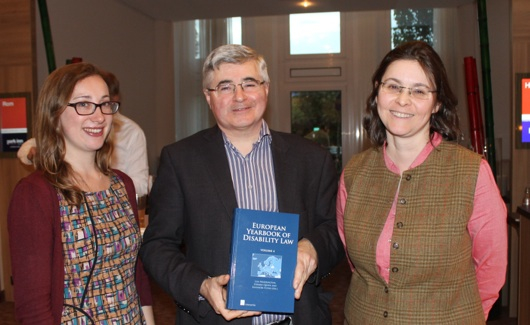
The Centre for Disability Law and Policy and the Maastricht Centre for Human Rights are pleased to announce the official launch of Volume 4 of its annual publication: the European Yearbook of Disability Law. On Thursday 19 September 2013, the Centres launched the Yearbook on the occasion of a large gathering of disability research experts at the University of Cologne.
Published annually, the European Yearbook of Disability Law tracks and analyses major developments on disability issues at European Level and is targeted at EU policy-makers, civil society groups and legal practitioners. It provides insight and oversight in this rapidly evolving field. The Yearbook is part of the ongoing, collaborative research programme of the Centre for Disability law & Policy (CDLP) at the National University of Ireland (Galway) and the Maastricht Centre for Human Rights of Maastricht University and is edited by Professor Gerard Quinn (Director of the CDLP), Professor Lisa Waddington (who holds the European Disability Forum Chair of European Disability Law at Maastricht University) and Dr Eilionóir Flynn (Senior Research Fellow at the CDLP), pictured above.
September 2013 - CDLP submit paper to the House of Lords Select Committee on the Mental Capacity Act 2005
The House of Lords Select Committee welcomed submissions on the operation on the Mental Capacity Act 2005. The CDLP submitted a paper to the Lords, outlining the recent trends in capacity law and the Irish reform process:
CDLP Submission to the House of Lords
August 2013 - EU DG Research singles out DREAM project as success story
The EU Directorate General for Research, led by Commissioner Máire Geoghegan-Quinn, has singled out the CDLP-managed Marie Curie DREAM project as a success story which is profiled on its website. To read this piece in full, click here.
For more information about DREAM, click here.
July 2013 - Leading Mental Health Reform Advocate appointed Adjunct Chair at NUI Galway
NUI Galway is delighted to announce the appointment of Gábor Gombos as Adjunct Professor of International Disability Law and Policy based at the Centre for Disability Law and Policy, part of the School of Law.
A physicist by education, Mr Gombos is widely recognized as a leader in the fields of legal capacity reform which deals with when, if ever, your decision-making capacity can be taken away. He is also known as a leading mental health reform advocate throughout the world. He has played an active part in the negotiations of the new UN Convention on the Rights of Persons with Disabilities, and he sits on the UN monitoring body that oversees implementation of the convention. In recognition of his long service in the field he was conferred with the Order of Merit (Knights Cross) by the Government of Hungary in 2009.
Mr Gombos, who resides in Budapest, already holds an adjunct chair at the Centre for Disability Studies at the National Academy for Legal Studies and Research in (NALSAR) Hyderabad in India.
The Centre at NUI Galway has also played a leading role worldwide in the evolution of new models of legal capacity which replace guardianship regimes with supported decision-making regimes and has been playing a leading role in Ireland on mental health reform. Both these topics - legal capacity and mental health reform – are crucial in the future evolution of global disability reform models.
Announcing the appointment, Professor Gerard Quinn, Director of the Centre, said: “Mr Gombos is credited with developing the notion of ’expertise by experience’ which generates knowledge and reform ideas from the people most directly affected. The Centre – by itself and as a constituent of Project Lifecourse with the Centre for Child and Family Research and the Irish Centre for Social Gerontology – has a real need to move in this direction and to create much more space for civic engagement through participatory research. His inputs will be of direct relevance to Project Lifecourse and not just to the Centre, and we envisage collaborating on large scale research bids in the field of mental health law innovation."
July 2013 - CDLP release press release on assisted-decision making (capacity) bill - "Cautious welcome for the Assisted Decision-Making Bill"
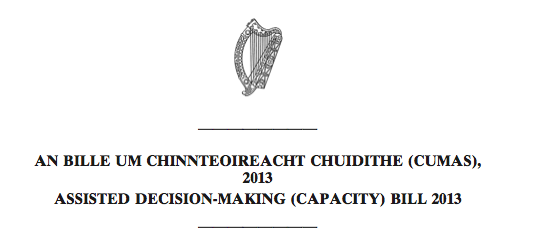
The CDLP has written a press release on the Assisted Decision-Making Bill released by the Government on July 17th, 2013. Prof. Gerard Quinn notes that this is a landmark moment in the process of disability law reform in Ireland. Dr. Eilionoir Flynn notes that there is room for improvement and stated that we will be making suggestions to ensure the primacy of the principle of will and preference is included throughout the Act to ensure respect for human rights.
To read the statement in full, including quotes from Dr. Mary Keys and Mr. Charles O'Mahony, click here: Cautious welcome for the Assisted Decision-Making Bill
A working group of civil society organisations also released this statement upon the publication of the Bill: Civil Society organisations statement
The group comprises the following: Alzheimer's Society of Ireland, Amnesty International Ireland, Centre for Disability Law and Policy, NUI Galway, Disability Federation of Ireland, Inclusion Ireland, Irish Mental Health Lawyers Association, Mental Health Reform, Neurological Alliance of Ireland, St Patrick’s University Hospital.
To read the bill, click here.
July 2013 - CDLP involved in drafting major report on deinstitutionalization in Israel
The CDLP is involved in action for people with disabilities in Israeli. Click here to see news item.
July 2013 - SOROS-OSF Video Profiles Disability Masters Scholar
SOROS-Open Society Foundations have commissioned a video profiling Elizabeth Kamundia, a graduate of the Law School Masters programme in Disability Law and Policy. Elizabeth was awarded the inaugural Gold Medal for the programme having graduated top of her class in 2012. She nows advices the Kenyan Human Rights Commission on legal capacity reform.
June 2013 - Fundamental Rights Agency appoint Quinn to Scientific Board
Gerard Quinn, Professor at the School of Law at NUI Galway and Director of its Centre for Disability Law and Policy, has been appointed to the ’scientific committee’ of the EU Fundamental Rights Agency (FRA) which is headquartered in Vienna. The EU FRA is one of the specialized agencies of the EU which was set up in 2007 to provide expert advice to the EU and its Member States to ensure that the fundamental rights of people living in the EU are respected. It helps to inform EU law and policy and to ensure that its power is properly harnessed to respect fundamental rights.
The ’scientific committee’ oversees the quality of the research of the FRA across a broad range of topics (e.g., racism, the rights of older people, privacy, the quality of the democratic process, etc.). This June (2013) Professor Quinn joins eleven other widely renowned experts from across Europe for a five year term. Quinn says “Europe is at a historic turning point away from failed economic and social models. It has a chance to reinvent itself as a force for good in its own citizens’ lives and around the world. This turn is by no means assured. But bodies like the EU FRA are at the fore of helping to redefine the EU of thefuture. That's why I am involved.”
The Head of the School of Law at NUI Galway, Professor Donncha O’Connell, says “I would like to warmly congratulate Professor Quinn on this prestigious international appointment. It speaks directly to his impressive track record as an engaged scholar animated by impact in the domain of public policy, something to which the School of Law at NUI Galway is deeply committed.”
May 2013 - Centre releases Press release in advance of event
The Centre for Disability Law & Policy and the Disability Federation of Ireland have released a press release on the event "the United Nations Convention on the Rights of Persons with Disabilities - Getting Ready to Ratify". This conference wil feature Theresia Degener, a memeber on the Committee on the Rights of Persons with Disabilities and will look at Irelands obsticles to ratifying the Convention.
To read the press release, click here: United Nations Convention on the Rights of Persons with Disabilities
May 2013 - Irish Disability Studies Association host first AGM
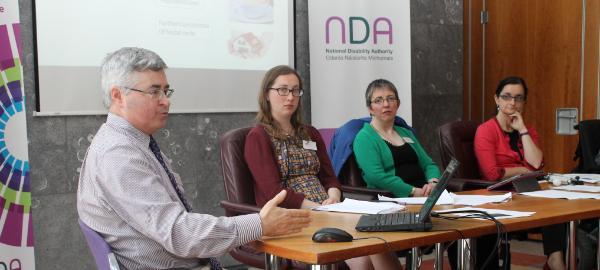
The first AGM of the Irish Disabilities Studies Association was held on the 10th of May 2013. Two members of the CDLP were elected for positions on the first committee; Elaine Keane was elected as secretary and Eilionoir Flynn was elected as a renewable ordinary member. After the AGM, the group had a seminar on the "next steps" that ireland must take before ratifying the Convention on the Rights of Persons with Disabilities. The group heard from Prof Gerard Quinn, Dr Rosarie McCarthy and Mr. Dermot Walsh.
The overall aims of the IDSA are to promote research and analysis about disability, informed by social models of disability; and to provide a forum on the island of Ireland, north and south, for analysis, discussion, exchange of ideas and scholarship on disability. The IDSA provides a space to bring together people and organisations with an interest in research and analysis of disability policy and practice, including the research community, people with disabilities, families and carers, public officials, practitioners, disability organisations, other non-governmental organisations and academic institutions.
April 2013 - LLMs meet the European Disability Forum
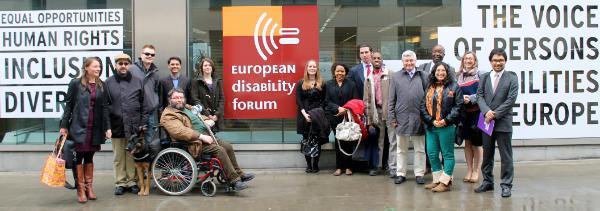
On Tuesday 9th April, 2013 the International and Comparative Disability Law Masters Class met with Etienne Cuche (European Parliament Officer for EDF) for an informal discussion to explore how this European Organization effectively represents the voice of persons with disabilities and ensures that they are heard within EU policy-making processes.
February 2013 - Prof. Gerard Quinn profiled by SOROS-OSF
Prof. Quinn is profiled in a blog post on the SOROS - Open Society Foundations website. Prof. Quinn talks about how he has seen changes in the area of disability law and talks about what an open society should mean. To read this post, please click here.
2012 Archive
December 2012 - CDLP Alumna profiled by SOROS-OSF
Elizabeth Kamundia, graduate of the LLM in International and Comparative Disability Law and Policy 2011 - 12 and inaugural gold medal winner in the class, is profiled in this blog on the SOROS - Open Society Foundations website. Elizabeth writes very positively of her time in Galway at the Centre for Disability Law and Policy whilst on a scholarship from SOROS - Open Society Foundations. To read Elizabeth's blog post, please click here.
November 2012 - Centre Graduates its Inaugural Masters Class
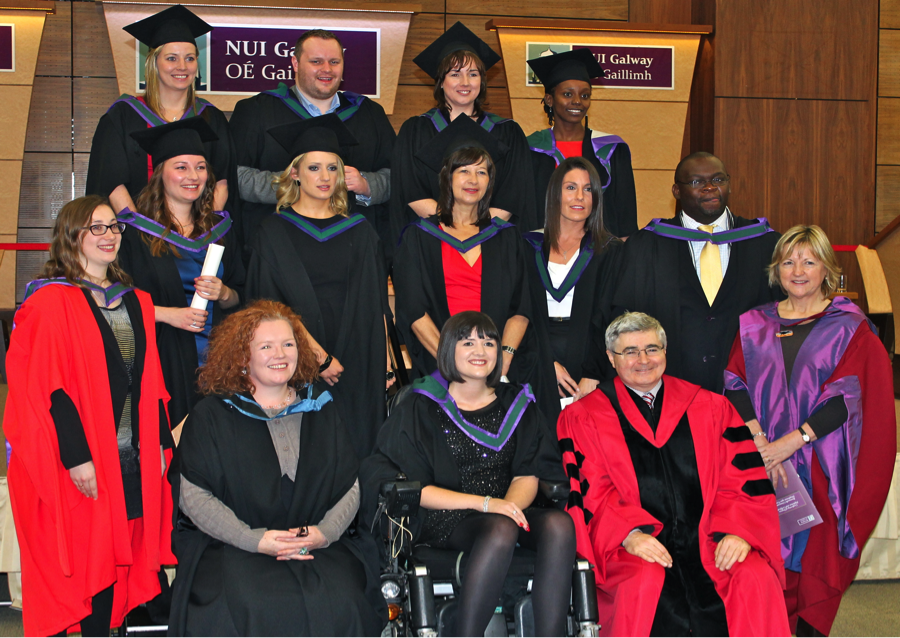
Pictured: The LLM in International & Comparative Disability Law & Policy Class of 2012 with their Lecturers on their Graduation day
November 2012 - CDLP memo on the US ratification process
In light of the recent discussions in the US Senate on the UN Convention on the Rights of Persons with Disabilities, the CDLP has written a memo on the U.S ratification process thus far. The memo is available to read here: CDLP memo on the US ratification process
October 2012 - Prof. Quinn in Washington at the conference "Toward a new US-EU Dialogue on Disability: the CRPD as a Transatlantic Bridge"
Prof. Quinn spoke in Washington on October 25th at the conference "Toward a new US-EU Dialogue on Disability: the CRPD as a Transatlantic Bridge". The event included a discussion of the opportunity for transatlantic dialogue and collaboration within the global disability agenda in the context of the CRPD. Facilitating a new transatlantic conduit for dialogue can aid effective implementation of the CRPD on both sides of the Atlantic. This bridge between the two continents can allow for disability policymakers and advocates to share knowledge and facilitate collaboration, ultimately driving solutions for the rest of the world.
Professor Quinn was joined in the discussion by international disability rights legal scholars and advocates Janet Lord and Eric Rosenthal.
September 2012 - New Soros Scholars meet with University President, Dr. Jim Browne
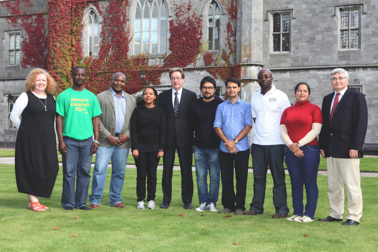
President Browne recently welcomed a cohort of SOROS Open Society Foundations scholars to Galway as they embarked on their studies on the LLM in International & Comparative Disability Law and Policy. The LLM programme, one of the first of its kind in the world and now in its second year, is supported by the international philanthrophic organisation SOROS Open Society Foundations, this year in the form of seven full-time scholarships for students from Nepal, Peru, Mozambique, Zambia and Zimbabwe.
Pictured L-R are: Shivaun Quinlivan, LLM Programme Director; Frankson Musukwa; Gabriel De Barros; Innocentia Mgijima; Dr Jim Browne; Alberto Vasquez Encalada; Kiran Wagle; Sindile Mhlanga; Pooja Bhandari; Professor Gerard Quinn, Director, Centre for Disability Law and Policy, School of Law.
July 2012 - CDLP Welcomes US Senate Hearings on UN Disability Treaty
A historic hearing on the UN Disability Treaty took place yesterday, 11th July 2012 in the US Senate Committee on Foreign Relations. Please click here to read Professor Quinn's commentary on the hearings: Commentary on hearings on the UN Disability Treaty
June 2012 - President Michael D. Higgins officially opens the 4th International Disability Summer School
To read the President of the University's speech : President Browne's speech
To read President Higgins' speech: President Higgins' speech
June 2012 - CDLP PhD research showcased by IRCHSS
The research of CDLP PhD candidate, Aisling de Paor, on genetic discrimination features as a Research Showcase on the Irish Research Council for the Humanities and Social Sciences (IRCHSS) website.
Please click here to view this research.
27th April 2012 - CDLP and Irish Human Rights Commission host seminar
The Irish Human Rights Commission (IHRC) and the Centre for Disability Law and Policy held a seminar on the 27th of April 2012. the Seminar was hosted by the Irish Human Rights Commission in Dublin. The aim of the seminar was to create a reflective space to explore the possible ways to develop a national "framework" in Ireland for the monitoring of the UN Convention on the Rights of Persons with Disabilities (CRPD) after Ireland ratifies this international human rights treaty.
To read more on this event, please click here: IHRC & CDLP Seminar
April 2012 - Legal Capacity Justice Committee Report
The Justice Committee of the Oireachtas chaired by David Stanton TD issued its report today based on hearings it held earlier in 2012. The CDLP was closely involved in the hearings - see the below post from the 20/02/1012 for more details.
The Committee accepted the arguments presented by the CDLP and others (which were based on the UN Convention on the Rights of Persons with Disabilities) and issued this historic report.
April 2012 - CDLP Memo Re: Vote on EU Structural Funds
Prof. Gerard Quinn, of the Centre for Disability Law and Policy, has released a memo on the upcoming vote on the EU Structural Funds. The purpose of this memo is to set out the legal and other implications that will predictably arise if the EU Council decides to remove the proposed ex ante conditionalities as they relate to disability from the draft General Regulation governing the Structural Funds.
The analysis contained in this memo is based on an assessment of the legal obligations assumed by the European Union upon its landmark ’confirmation’ (’ratification’) of the UN Convention on the Rights of Persons with Disabilities (UN CRPD) in 2010.
Fuller analysis is provided in a more detailed Study to be launched by the UN Office of the High Commissioner on Human Rights (European Region) in May 2012: ’Getting a Life – Living Independently and Being included in the Community: A Legal Study of the Current Use and Future Potential of the European Structural Funds to contribute to the achievement of Article 19 of the UN convention on the rights of persons with disabilities’ (Quinn & Doyle).
Read the full memo here: CDLP Memo on Vote on EU Structural Funds
March 2012 - Centre for Disability Law and Policy host SOROS - Open Society Foundations convening
In March 2012 the CDLP was honoured to host a convening of SOROS-Open Society Foundations disability grantees from around the world. SOROS-OSF funds law programmes on disability rights and scholarships at several law schools from South Africa, Argentina, Nepal, the US, the UK and Ireland and brought them all together for the first time at NUI Galway to explore continued and deepened collaboration.
The delegation and their grantees met with current LLM in Disability Law and Policy SOROS-OSF scholars and as well as students involved with the Disability Legal Information Clinic. See photographs of the convening here.
03/04/2012 - Amnesty Ireland and CDLP launch legal capacity essential principles
Amnesty Ireland and the Centre for Disability Law and Policy co-chaired a process to develop human rights-based principles to underpin new legal capacity legislation. Fifteen civil society organisations have signed up to these principles which were launched at a national seminar on April 3rd.
The Legal Capacity Essential Principles document can be seen here: Legal Capacity Essential Principles
12/03/2012 - Proposed Disability Studies Association of Ireland
A meeting was held in University College Dublin on the 12th of March to discuss the possibility of establishing a Disability Studies Association of Ireland. Professor Dan Goodley, lecturer in Manchester Metropolitan University and a member of the Disability Studies Association in the United Kingdom, spoke about the his experience and offered advice on how Ireland should take its first steps in establishing an association. There was a range of people in attendance, all with an interest in advancing disability studies. Various universities were represented, service providers, self advocates and interest groups. Break out groups discussed what an association would aim to do and how best these aims could be achieved. All groups agreed that Disability Studies should be promoted and the association should facilitate sharing of knowledge and networking.
The next Disability Studies Association of Ireland meeting will be held by Dublin City University.
2011 Archive
09/02/2011 - Vacancies for Senior Research Fellow
The National University of Ireland Galway, is seeking outstanding candidates for a Senior Research Fellow fixed term contract position at the Centre for Disability Law and Policy. The Centre for Disability Law and Policy (CDLP), National University of Ireland Galway, Ireland was founded in 2008 and is funded by philanthropy as well as research contracts mainly from the European Union. This appointment will be made initially on a one year basis with the possibility of extension for a further three years. The successful candidate will be expected to direct the research projects of the Centre, to play a leading strategic role with respect to the ongoing development/refinement of the Centre’s research agenda and to take a leading role in crafting suitable research bids.
Full information is available via the NUI Galway Job Vacancies Page, or consult this application information document: Senior Research Fellow
07/02/2011 - Vacancies for Researchers/PhDs
Applications for Marie Curie Early Stage Researchers in the DREAM consortium (Disability Rights Expanding Accessible Markets) are now open at http://www.nuigalway.ie/dream.
2010 Archive
15/01/2010 - Launch of European Yearbook of Disability Law (Volume 1)
The European Yearbook of Disability Law (Volume 1), an annual collaborative project between NUI Galway and the University of Maastricht, will take place on Friday 29th January 2010. Attendees will be welcomed by NUI Galway President, Dr. Jim Browne. Mr Hywel Ceri Jones will formally launch the Yearbook. He is the co-chair of the Consortium of European Foundations (Philanthropies) on Human Rights Disability (Brussels), and the former Deputy Director General of DG Employment, Social Affairs & Equal Opportunities in the European Commission. Professor Gerard Quinn, Director of the Centre, will talk briefly about upcoming publications and events within the Centre and its international collaboration.
Tuesday, 27 June 2017
The Irish Disability Studies Association (IDSA) and the Centre for Disability Law and Policy were delighted to host a poster presentation at the 9th International Disability Law Summer School on June 20th. The poster presentation was open to researchers from any discipline related to disability and disability advocates to discuss their work with colleagues and Summer School participants in an informal setting. We received posters from 36 individuals and organisations and the event was attended by over 110 delegates.The poster presentation was adjudicated by Professor Amita Dhanda, Professor of Law and Head of the Centre for Disability Studies at the National Academy of Legal Studies and Research, University of Law, Hyderbad, India, and prizes were awarded for the best student poster and the best advocates poster. The winner of the best student poster presentation award was Emily Loughlin, PhD Candidate at NUI Galway for her poster on Exploring Community Living from a Lifecourse Perspective - Toward Lifecourse Policy Options. The winners of the best advocate poster presentation award were Christina Burke and Brian Donohoe from the Inclusive Research Network (IRN) for their poster Our Homes. Congratulations to the winners and to everyone who took part.
Tuesday, 28 April 2020
Living and Learning Empathy in Covid-19: A Virtual Global Conversation Watch live on Facebook @NUIGalway or playback here. About this Webinar Series Ironically, even though as individuals, families, communities and countries we have ‘self-isolated’ as a result of the coronavirus, our forced disconnection may in fact lead us to be more aware of each other and connected and like never before. Across civic society we are, and will continue to be, challenged in ways heretofore unseen. Our social empathy for one another may well be the ‘vital secret sauce’ to our survival. In order to thrive, not just survive, the impact of the virus, we will need to create medical, economic and human support scaffolding to make solutions work. As a contribution to help us understand the on-going impact of Covid-19 and ways in which we can all help respond now and, in the future, a series of 12 weekly National/International free to public virtual conversations will be held and hosted by the Institute for Lifecourse and Society (NUI Galway) and The Global Network of UNESCO Chairs for Children, Youth, and Communities in collaboration with Penn State University. Each week the virtual conversation, which will be free, globally accessible, and delivered across time zones to the public, will bring together the views of academics, policymakers and most importantly citizens directly affected by the coronavirus and living with its consequences. This will include a focus on kernel issues for children and youth, parents, older people, families, people living with a disability and communities as well as in differing cultural and international contexts. It is hoped the conversations will assist human understanding and compassion in relation to the coronavirus as well as proposed solutions for societies to connect and cope and become more resilient. The First Living and Learning Conversation in Covid-19 took place on Thursday, April 30 2020 and the series will run weekly for 12 webinars. Each week the conversation will alternate between an Irish and International focus across differing life course and or cultural challenges. All events are free to the public who are strongly encouraged to participate, ask questions in advance, and propose topics for conversations. All conversations can be accessed live through an online platform. All conversations will provide evidence-based knowledge, experiences from people facing the pandemic, and suggestions for what all of us can do to see everyone through this crisis. Webinar Co-Convenors: Prof Pat Dolan, NUI Galway and Prof Mark Brennan, Penn State University Webinar 12: Thursday 16th July, 6pm (GMT+1) Watch live on Facebook @NUIGalway Here or playback Here Webinar: Looking Back and Moving Forward with Empathy In this the final week of the Webinar series we focus very much on our understanding and knowledge on Empathy and why it has been and will continue to be so important in coping with COVID 19. We also reflect back on the lessons learned over the previous Webinars, what have been the common experiences across populations and in relation do differing human need. We also consider the life course factors including issues for younger and older persons and challenges and self-solutions from people living with a disability. Importantly we consider the evidence on Empathy and how it can contribute nationally and internationally to not surviving the virus but our thriving into the future. Speakers: Ms. Kate Berardi, Empathy Fellow Penn State University, USA, Dr Charlotte Silke, Empathy Researcher UNESCO Child and Family Research Centre NUI Galway, Professor Ciarán Ó hÓgartaigh, President NUI Galway, and joint convenors of the Webinar Series UNESCO Chairs Professors Dolan and Brennan. Moderator: Acclaimed Irish Times Journalist Ms. Kitty Holland. Webinar 10: Thursday 2nd July, 6pm (GMT+1) Missed it on Facebook @NUIGalway? Watch it back in full on YouTube Webinar 9: Thursday 26th June, 6pm (GMT+1) Missed it on Facebook @NUIGalway? Watch it back in full on YouTube Summary/Abstract: Empathy and Ensuring Youth Health and Well-Being during COVID-19 The COVID-19 pandemic has highlighted countless areas and challenges where our global society has been impacted. Among the most pressing, but largely overlooked areas, have been the impacts on the well-being of children and youth. This includes the current physical, mental, and emotional challenges facing youth, but also their families and peers. This week our webinar will explore all of these, along with social historical contexts of how crises and pandemics have often left the most vulnerable – children and youth – unprotected. Most important it will present current cutting edge research as a guide for how children, youth, and families can be empowered to deal with the current and emerging challenges. Speakers: Priya Prakash, Founder and CEO of HealthSetGo, Global Citizen Award Winner, Dr Sarah-Anne Buckley, School of History / UNESCO Child and Family Research Centre NUI Galway, Maria Kypriotou, Senior Youth Specialist Social and Human Sciences Section, UNESCO Headquarters Paris, France, Dr Óscar Prieto-Flores University of Girona, Spain, Dr Bernadine Brady UNESCO Child and Family Research Centre, NUI Galway Moderator: Co-Moderated by UNESCO Chairs Prof Pat Dolan (Ireland) and Prof Mark Brennan (USA) Webinar 8: Thursday 18th June, 6pm (GMT+1) Missed it on Facebook @NUIGalway? Watch it back in full on YouTube Summary/Abstract: Supporting vulnerable students during COVID-19 – a showcase of the University of Sanctuary and the ALIVE Programme This webinar entitled ‘Supporting vulnerable students during COVID-19 – a showcase of the University of Sanctuary and the ALIVE Programme’ will outline how NUI Galway has responded to our students living in Direct Provision to ensure their safety and ongoing success in higher education. In addition it will highlight how the ALIVE Volunteer Programme has developed new measure to award and honour students who have been volunteering in community and society. Speakers: Aidan Harte, NUI Galway, Suzanne McKane, Galway City Partnerships, Michelle Dube, NUI Galway, Lorraine Tansey, NUI Galway and Dara Kerins, NUI Galway. Moderator: Dr. Lorraine McIlrath, Community Knowledge Initiative (CKI), NUI Galway. Webinar 7: Thursday 11th June, 6pm (GMT+1) Missed it on Facebook @NUIGalway? Watch it back in full on YouTube Summary/Abstract: Youth Media, Literature, and Voice in COIVD-19 The giving and receiving of empathy can take many forms and can be shared in many ways. Perhaps most visible in popular culture is young people exhibiting empathy and raising awareness of societal conditions through music, spoken word, and literature. These outlets are accessible to all peoples, regardless of their social, economic, or political settings. Historically youth have used these to make the wider world aware of the global issues we all are facing. This webinar will showcase how youth are engaging around COVID-19 to share their experiences and open up opportunities for others to positively engage in addressing the pandemic. Speakers: Eoin Dolan, Soundsurfers, Dr Bernadine Brady, UNESCO Child and Family Research Centre, Roisin Hanley & Jack Gaffey, Youth as Researchers, UNESCO Child and Family Research Centre. Moderator: Professor Mark Brennan, UNESCO Chair, Pennsylvania State University. Webinar 6: Thursday 4th June, 6pm (GMT+1) Missed it on Facebook @NUIGalway? Watch it back in full on YouTube Summary/Abstract: Involving the public and the patient in shaping research during COVID-19 Increasingly, the voice of the public and of patients is influencing and shaping research, improving the relevance and quality of research, and increasing public accountability and transparency, particularly in publicly funded research. The research community is responding with speed to the COVID-19 pandemic, a pandemic that is affecting everyone in society. We will consider the challenges and opportunities of ensuring the ongoing inclusion of the public and patient voice in research during the pandemic, with contributions from the perspective of the researcher, the public, the patient and the research funder, in Ireland, the UK and Australia. Speakers: Prof Sean Dinneen, School of Medicine, NUI Galway, Dr Avril Kennan, Health Research Charities Ireland, Deirdre McLoughlin, PPI Ignite @ NUI Galway Public Advisory Panel, Casey Donaghey, Dr Anne Cody, Health Research Board, Ireland, Anne McKenzie, Telethon Kids Institute, Western Australia, Derek Stewart, OBE, Patient Advocate, UK. Moderator: Edel Murphy, PPI Ignite @ NUI Galway. Webinar 5: Thursday 28th May, 6pm (GMT+1) Missed it on Facebook @NUIGalway? Watch it back in full on YouTube Summary/Abstract: NUI Galway will present a live discussion with representatives of The Barça Foundation and the GAA to explore sport’s role as a tool for good in supporting society – with a particular emphasis on the development of life skills such as empathy and identity for young people during Covid-19. Armagh Footballer Caroline O’Hanlon and Dublin Footballer Jack McCaffrey will provide the players’ perspective in an event that will share stories of humanity and community engagement as well as exploring future connections needed to cope through sport beyond the first wave of the coronavirus crisis. Speakers: Caroline O'Hanlon, Armagh Footballer, Jack McCaffrey, Dublin Footballer, Yolanda Antin, Partnerships Coordinator, Foundation of Football Club Barcelona, Colin Regan, GAA Community & Health Manager, Kalyn McDonough, University of Delaware, Mark Brennan, UNESCO Chair, Pennsylvania State University, Ria Ramnarine, 3-Star AIBA (International Boxing Association) Coach & Former World Boxing Champion. Moderator: Professor Pat Dolan, UNESCO Chair, UNESCO Child and Family Research Centre, NUI Galway. With the collaboration of Barça Foundation Webinar 4: Thursday 21st May, 6pm (GMT+1) Missed it on Facebook @NUIGalway? Watch it back in full on YouTube Summary/Abstract: This webinar will consider the human rights impact of COVID 19 through contributions from academics, activists and policy makers. Concerns have been raised globally about discrimination in access to healthcare, including the use of medical triage and rationing approaches which endanger the lives of disabled people. This crisis also impacts on the lives of persons with disabilities residing in congregated services or availing of community support (including personal assistance and other support services) which social distancing and self-isolation has rendered increasingly difficult or impossible to access. We will consider how the rights of persons with disabilities can be respected, protected and fulfilled during COVID, and what lessons we can all learn from disability activists which may endure beyond this pandemic. Speakers: Catalina Devandas Aguilar, Special Rapporteur on the rights of persons with disabilities, James Cawley, Independent Living Movement Ireland (ILMI), Peter Kearns, Independent Living Movement Ireland (ILMI), Fiona Anderson, Independent mental health advocate, Frank Conaty, Commissioner, Irish Human Rights and Equality commission (IHREC), National Platform of Self Advocates. Moderator: Dr. Áine Sperrin, Centre for Disability Law & Policy, NUI Galway. Webinar 3: Thursday 14th May, 6pm (GMT+1) Missed it on Facebook @NUIGalway? Watch it back in full on YouTube Summary/Abstract: “Ubuntu is to say, ‘My humanity is inextricably bound up in yours.” – Desmond Tutu South Africa is known as one of the most unequal countries in the world, and with COVID-19 the country’s challenges are amplified. South African students who are part of MAD Leadership Foundation will share their stories of the challenges they face during the COVID-19 pandemic and how the spirit of Ubuntu seems to be even stronger during times like these. We will also hear how the foundation continues to support their scholars with empathy and understanding during this time. Speakers: Helette Pieterse, Moeketsi Mashibini & Andile Nkabinde, Make a Difference Leadership Foundation, Cape Town, Alan Kerins, Humanitarian, The Inner Winner Institute, Pat Dolan, UNESCO Child and Family Research Centre, NUI Galway. Moderator: Professor Mark Brennan, UNESCO Chair, Pennsylvania State University. Webinar 2: Thursday 5th May, 6pm (GMT+1) Missed it on Facebook @NUIGalway? Watch it back in full on YouTube Summary/Abstract: Child Protection is everyone’s business. Equally so, family support is everyone’s business. COVID-19 has deepened the stress for some children, young people and families and created new issues and problems also. Greater understanding of these issues can lead to enhanced empathy towards those in need. The aim of the seminar is to increase public awareness of protecting children and supporting families in the context of the COVID 19 pandemic and to consider what is being done and what else can be done to ensure we minimise the risk of harms and maximise the potential for support. Speaker: Professor Caroline McGregor, National University of Ireland, Galway, Dr Carmel Devaney, National University of Ireland, Galway. Moderator: Professor John Canavan, UNESCO Child and Family Research Centre, National University of Galway, Ireland. Webinar 1: Thursday 30th April Missed it on Facebook @NUIGalway? Watch it back in full on YouTube Welcome Address: Ciarán Ó hÓgartaigh President, National University of Ireland, Galway & Nicholas P. Jones, Provost, The Pennsylvania State University. Speakers: Professor Pat Dolan, UNESCO Chair, National University of Ireland, Galway, Professor Mark Brennan, UNESCO Chair, Pennsylvania State University, Dr. Dana Winters & Dr. Annie McNamara, St Vincent’s College/Fred Rogers Center, USA. Respondents: Ms Ella Anderson, Youth Researcher, UNESCO Chair, National University of Ireland, Galway & Dr. Kyle Peck and Dr. Ann Echols, Intergenerational Leadership Institute at Penn State. Moderator: Carl O'Brien is Education Editor of The Irish Times. NUI Galway Research Institutes’ Covid-19 Alliance (RICA)The extent and impact of the coronavirus pandemic requires a coordinated research response across disciplines. Five research institutes at NUI Galway have formed Covid-19 Response Groups to address complex challenges in science, data analysis, business, the social sciences and humanities.
Thursday, 1 March 2018
Congratulations to our CDLP colleague Dr María Laura Serra whose PhD thesis just won the Universidad Carlos III de Madrid Pilar Azcárate gender and equal opportunities award! Laura also recently published a monograph based on her thesis titled "Mujeres con discapacidad : sobre la discriminación y opresión interseccional".
Tuesday, 14 April 2020
Statement on the rights of persons with disabilities during COVID-19 Updated 12th May 2020 We welcome the ongoing work by the National Public Health Emergency Team, the Department of Health, HSE services, Department of Housing, Planning and Local Government; and the Department of Rural and Community Affairs during this pandemic. We are calling on all state actors to adhere to their obligations under the United Nations Convention on the Rights of Persons with Disabilities (UNCRPD), which Ireland ratified in March 2018. The UNCRPD articles which warrant specific consideration during the current crisis in Ireland are discussed below. The authors recognise the use of the terms ‘disabled people’ by some disability activists in Ireland. However, this paper uses ‘persons with disabilities’ in line with the text of the UNCRPD. DOWNLOAD Full statement >> Statement on the rights of persons with disabilities (May 2020)
Wednesday, 10 October 2018
On September 3 2018, Andrea Broderick was chosen out of 7 academic nominees of high calibre and was awarded the prestigious Edmond Hustinx Prize (€ 15,000) for her recent research activities on equality and accessibility for persons with disabilities. According to the jury awarding the prize: ‘In a short period of time, Dr. Broderick built up a very good reputation in the field of disability law and the law of equal treatment [generally]. She publishes in the major international journals in this field and is in the final stage of [co-authoring a textbook] on International and European Disability Law to be published with Cambridge University Press. She is also in high demand as a speaker at conferences around Europe and a much-appreciated lecturer in a range of different courses in both Maastricht and Hasselt [University]. The Edmond Hustinx Prize will provide her with vital resources to undertake this research’.Andrea Broderick is a graduate of NUIG, where she completed both her undergraduate and Master studies. After having undertaken the LLM in International and Comparative Disability Law and Policy offered by the CDLP, Andrea went on to complete her PhD at Maastricht University under the framework of the DREAM (Disability Rights Expanding Accessible Markets) network of researchers.
Monday, 24 April 2017
The Centre for Disability Law & Policy and NUI Galway and its family of alumni around the world mourns the loss of Donal Toolan. Donal was one of the founders of the disability rights movement in Ireland and an inspirational leader. He spoke with great moral conviction and clarity – and was never afraid to speak out. He challenged deeply held assumptions and was always especially attuned to hypocrisy and double-think.The Director of the Centre, Prof Gerard Quinn said “We have now lost Donal. And we recently lost Frank Mulcahy and Martin Naughton. Together they were the best generation. They reminded people that the founding ideals of this Republic over 100 years ago concerning the inherent equality of all citizens was just an empty myth for several generations of people with disabilities. But they were equally clear that it was also an ideal worth fighting for. Its time now for a new generation to emerge and take the baton. Donal lit a bright path for them. We mourn his loss, treasure our memories and will try hard to send the next generation on their way in his –and their –honour.”Prof Gerard QuinnDirector
Friday, 1 December 2017
On 22nd November 2017, the initiative Community Living for Europe: Structural Funds Watch launched a Report in the European Parliament co-hosted by Mairead McGuinness, MEP (EPP) and Vice President of the European Parliament and Iskra Mihaylova, MEP (ALDE) and Chair of the European Parliament Committee on Regional Development. This report concerns the role of the European Structural and Investment Funds (ESIF) with respect to the transition from institutional to community-based living for children and young people, including those with disabilities, adults with disabilities and older persons in European Union Member States. It contains examples, both positive and negative, that demonstrate how the Member States have implemented the ESIF regulations, how they are currently using or are planning to use the ESIF to support the transition to community-based living, and provides concrete recommendations for the current and next funding period post 2020. Neil Crowther, Gerard Quinn and Alexandra Hillen-Moore “Opening up Communities, Closing down InstitutionsOpening up Communities, Closing down InstitutionsOpening up Communities, Closing down Institutions: Harnessing the European Structural and Investment Funds” (Community Living for Europe: Structural Funds Watch, November 2017) Further information is available at www.communitylivingforeurope.org or by contacting Alexandra Hillen-Moore, Initiative Coordinator on communitylivingforeurope@nuigalway.ie.
